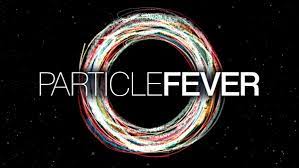A wall poster of General Pétain features in the opening sequence of ‘Casablanca’ (1942) and that film concludes with a bottle of Vichy water tossed into the rubbish bin. That’s about all I knew about Vichy France.
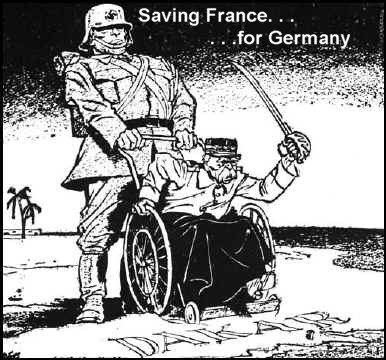 Pétain was 84
Pétain was 84
Whereas every other country Nazi Germany conquered was placed under direct German rule, France was not. The Vichy Regime, as it became known, by the terms of the Armistice was to govern all of France, even though the North was occupied by Germany. The Occupation was only military. Civilian life was the domain of the French government, temporarily located in Vichy.
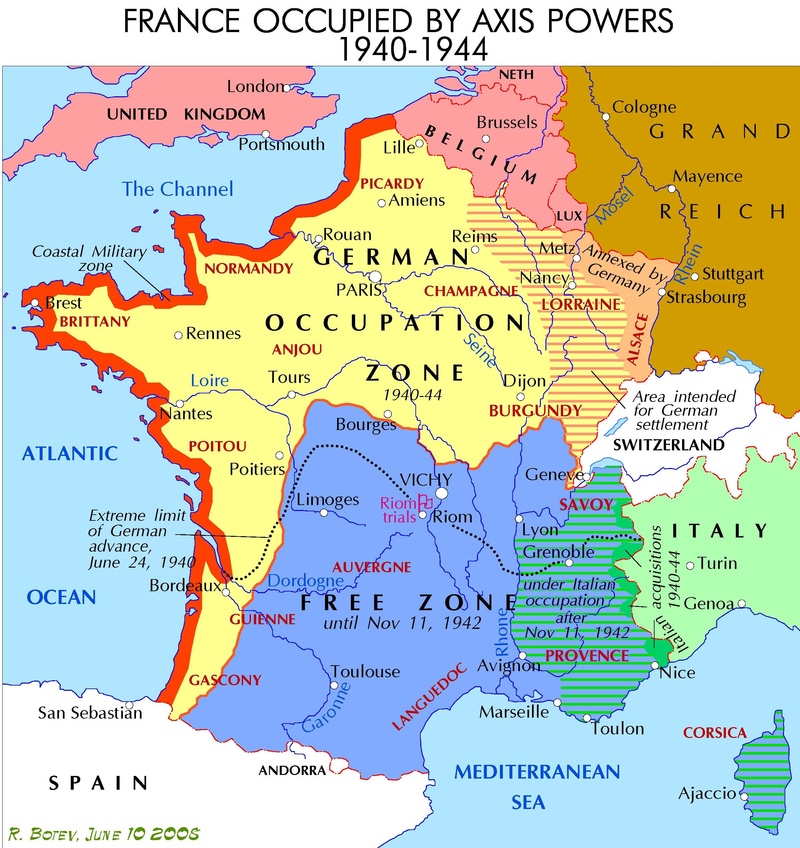 Divided and dismembered France
Divided and dismembered France
Among the overarching themes in the book are these: First, Vichy evolved as the war developed. It transformed itself, in part, and was later transformed by the Germans. Second, at the start Vichy earnestly sought co-operation with Germany, to which Germany was indifferent for a couple of years, until the tide of the war changed the calculus. Third, Vichy had nominal responsibility for the whole of France, i.e., including the Occupied Zone in the North and West for schools, hospitals, police, roads, and so on. Fourth, in practice France was divided into three not two zones, the third being Paris itself where the German presence was the greatest and collaboration was the most blatant. Fifth, the Vichy regime was internally riven by ideology, religion, region, and personality, united only by an abhorrence of the Third Republic and a willingness to work in Vichy. Sixth, Vichy’s commitment to retaining the Empire ran deep, hence the undeclared naval warfare with Britain, the defence of Syria and Algeria, and Vichy bombing attacks on Gibraltar. Vichy propaganda supposed Britain’s only war aim was to seize the French Empire. In this context Vichy propaganda portrayed General de Gaulle as a puppet for Britain to steal the French Empire away, which partly explains his intransigence in trying to retain every foot of the French Empire from Syria to Morocco.
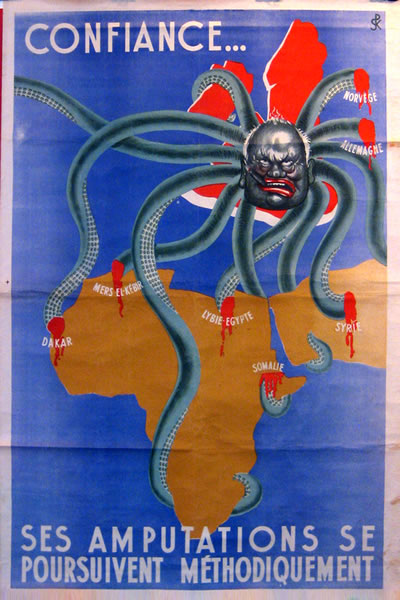 That is Churchill as the head of the octopus
That is Churchill as the head of the octopus
Germany wanted France out of the war, and did not want a French government-in-exile to continue the war in any way. Why not? After all the Norwegian, Dutch, Polish, Belgian, and Luxembourg governments-in-exile existed and were of little moment.
France was different because (1) of its proximity to Britain for the putative invasion, (2) its size compared to these others, (3) its navy which was second only that Britain, and (4) its colonial empire, particularly in North Africa – Algeria, Tunisia, Morocco, and the Levant. A united French government-in-exile might make a very large difference in one or all of these dimensions.
As to (1), in July 1940 the German plan was to concentrate on an invasion Britain as soon as air supremacy over the Channel was achieved, not on occupying and subduing every corner of France. Let the French govern themselves in everyday life, policing, sanitation, railroads, hospitals, water, roads, schools, and so. Call these matters administration. Of course, such administration continued in the other occupied Western European countries but run by Germans. Read on.
(2) The difference in France was size and location. German staff estimates of the troops needed simply to occupy all of France were considerable, let alone what would be necessary to subdue continued resistance in a rear-guard or guerrilla action in the Vosges, Alps, Pyrenees, Massif central mountains or the swamps of the Gironde, Loire, Rhone, and Saone rivers. It was best to make peace so that France could be used as a platform against Britain, and as a resource of food, men, and armaments. As it was the German army of occupation in France numbered a mere 40,000 for a population of 45 million, and most of those Germans were concentrated along the North coast opposite Britain. When resistance attacks began, that number increased and the overall calculus changed.
(3) The French navy was distributed around the world, though much was in French waters, not all. There were major elements in Africa (Algeria and Senegal), and there were 18,000 French sailors and more than one hundred ships in England in June 1940. Germany did not have the means of using the ships in French waters, i.e., it did not have the seaman and officers to man them, still less did it have a surefire way to recall the fleet from Africa, Caribbean, and Pacific. The best option then was to neutralise it by an agreement with the French government, i.e., the Armistice, to keep the ships out of the hands of Britain which might have the means to use them. Hence the fiction that Vichy was sovereign neutral. If and when Germany needed the ships, they would then be available. The fiction of French sovereignty kept the much of the fleet on ice for several years.
(4) Finally the colonies were a distraction to Germany. It had no means to occupy even those of strategic value, e.g, French Somaliland on the Red Sea, Lebanon and Syria (then French protectorates) with ready access to Middle East oil, or Dakar (Senegal) with its excellent deep water port on the Atlantic. Each would have been useful, respectively, to disrupt the Suez Canal, either secure Iraq oil or disrupt British access to it, and to base submarines in the Atlantic. Even so, Germany did not have the means (at the time) to do anything about them. Neutrality would be the best, immediate result to keep them out of British hands while the final battle for Britain occurred and allow for the possibility that later Germany would make use of them, brushing Vichy aside.
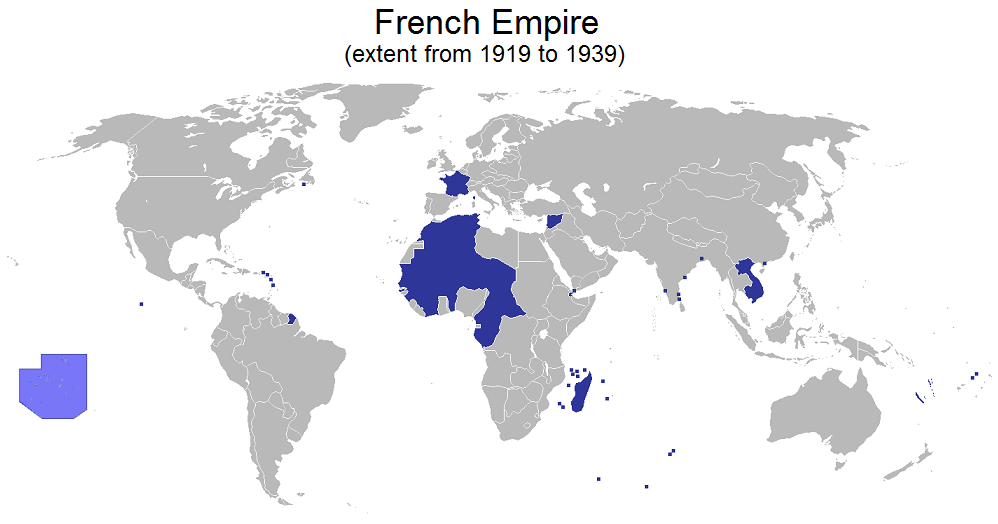
However, when Hitler turned east to the Soviet Union, then the demands on France changed, and would change again when the Allies landed in North Africa, expelled Germany from Tunisia, invaded Italy and drove it out of the war, and landed at Normandy. Each time, the German bear-hug on France tightened.
The 1940 Armistice allowed France, alone among the conquered European countries to retain a sovereign government beyond the daily administration alluded to above. France was divided into two zones and Vichy had about 30-40% of the country by either area or population. While much of France’s industry was in Paris and the north, Michelin tires, for example, was located within Vichy and several large manufacturers were in Marseilles and Toulon. The Armistice implied that once the war was won against Britain, the Vichy regime would be located in Paris and the northern Occupied Zone would dissolve. Meanwhile, Vichy received ambassadors from the United States and Canada and thirty (30) other countries, negotiated with Britain in Madrid for French assets, sold war matériel to Italy, imported food from Latin America, appointed new governors to its empire abroad … for a time.
Meanwhile, the regime was temporarily housed in the hotels of the spa town of Vichy. Why Vichy? Because nearby Clermont-Ferrand had the very best railway connections and Vichy itself had the most modern telephone exchange in France, connecting it easily to Paris, Berlin, Marseilles, and any where else. Moreover, one the most influential members of the Vichy Regime had major commercial interests there, and probably lobbied for the location, namely Pierre Laval.
By the Armistice, Vichy had administrative responsibly in the Occupied Zone, and near sovereignty in its Free Zone. Indeed, it maintained an Armistice Army of 100,000, unique in conquered Europe. That it existed, motivated many officers and men to be loyal to Vichy until November 1942 when it was disarmed and disbanded.
Though not stated in the Armistice, Paris quickly became a separate, third zone in everything but name.
Paxton convinces this reader that the Vichy regime attempted to use the situation to break with the past of France, and start the National Revolution to wind the cultural clock back. The first break with the past was the name. It called itself L’État Français and not La Républic Français. It repudiated the Republic and all it represented. It was a utopian moment when the discredited past burned away, allowing a Phoenix to rise. And because authority was concentrated in the executive, Pétain and the cabinet, with no carping, criticising parliament to be accommodated, it was a green-fields opportunity to (re)create a society afresh by dictate.
The Vichy Regime was Catholic not secular, agrarian not urban, insular not cosmopolitan. It did not celebrate the Rights of Man but rather the duties of a good Catholic to pray, work the land, procreate, and shun outsiders. On grounds that a religion brings order and calm it embraced Catholicism, though none of the principals of Vichy was ever religious, and certainly not Pétain himself, still less Laval. The school curriculum was changed and the Catholic Church invited to re-enter the classrooms from which it had been expelled after the Revolution. Science was de-emphasized. Curriculum committees set to work cutting French literature down to Vichy-size, big ideas out, duty and humility in. Girls were encouraged to pray and bear children for France. Withal, the author argues that Vichy was not fascist, but rather nationalist, nostalgic, and conservative. For example, its anti-Semitism was culture not racial. Hence the efforts of Vichy, ineffective though they were, to protect converted Jews.

Paxton shows in a great many ways that the Vichy Regime strove to be an active partner with Germany when it seemed that Germany’s final victory was only a matter weeks away. Again and again, Vichy took the initiative to expel Spanish Republican refugees, to identify foreign Jews, to surrender arms, to bomb Gibraltar, to turn over information, to oppose Britain in word and deed, and to excoriate de Gaulle. Later, by 1944 the tables had turned and Vichy was merely a German catspaw, but that was not the case in 1940, in 1941, in 1942, in most of 1943, and even in some ways in early 1944.
Phillipe Pétain headed the Vichy government, bringing to it little more than his name, as the victor at Verdun in 1917 and a reputation, in contrast to so many in World War I, for saving the lives of his men behind fortifications and not spending them in pointless attacks. He was 84 years old when he took over. German intelligence kept an eye on all things Vichy including Pétain himself, and its assessments repeatedly confirmed that the old man had his wits about him, though he tired easily in the afternoons. We should all be so fit at that age.
When the time came the Vichy regime made itself a German catspaw. To make work in the South it negotiated contracts for war matériel for Germany. When Germany demanded slave labour, Vichy conscripted it. When Germans retaliated for resistance attacks by shooting hostages, Vichy volunteered to do that, and in some cases exceeded the German appetite for blood, as both local and national authorities settled old scores, personal and political. Most of all it delivered up Jews ever easier. Once on the slippery slope, the only way was down and down into the levels of Hell.
 Frenchmen arresting Frenchmen to please Germans.
Frenchmen arresting Frenchmen to please Germans.
 French volunteers against Bolshevism on the Russian Front.
French volunteers against Bolshevism on the Russian Front.
Paxton chronicles the infighting, careerism, exploitation, profiteering, undermining, conflicting personalities within the hothouse of Vichy, though he offers no explanation for the remarkable dismissal of Pierre Laval in 1941, who bounced back and exacted revenge on his real and imagined enemies. The seamy side of Vichy is well realised in some of J. Robert Janes’s krimies set in this time and place like ‘Flykiller’ (2002).
One of the claims of Vichy was stability. Unlike the volatile Third Republic where governments lasted six months at best, and often less, Vichy would be a rock, as Pétain was at Verdun. Vichy propaganda repeated that claim untinged by the fact that its was a government set to musical chairs with six ministers of defence in one year, and a parade of prime ministers (until the Germans put a stop to it): Pétain, Weygand, Laval, Flandin, Darlan, and Laval again in less than 2 1/2 years. The Third Republic had longer periods of ministerial stability than Vichy ever had. Rather reminded me of the Murdoch media where what matters is repetition not veracity. Pétain wanted to remain prime minister and tried to regain that post but lost in these manoeuvres Laval.
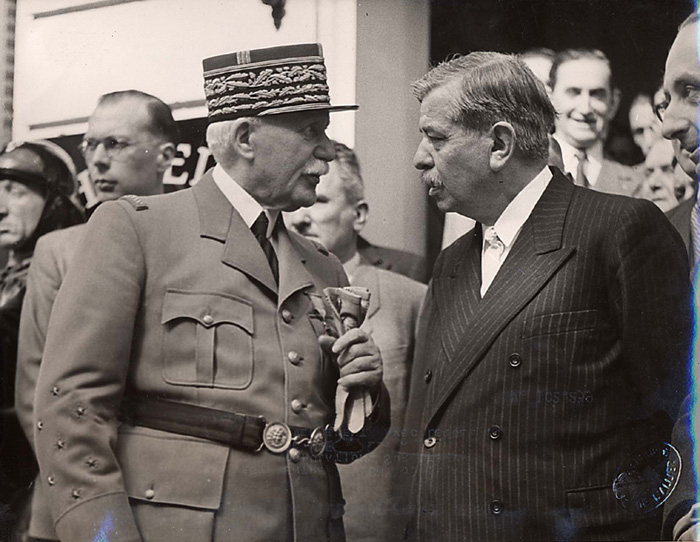 Pétain and Laval. They despised one another but were bound together in a bargain with the Devil in Berlin.
Pétain and Laval. They despised one another but were bound together in a bargain with the Devil in Berlin.
This book also makes very clear just how very alone Charles de Gaulle was on the 18th of June 1940 in London and how alone he remained for quite a time, making his creation France Libre all the more remarkable. De Gaulle remained alone because the chain of command in the army and the colonies held, despite the catastrophes of the defeat, the surrender, the occupation, the dismemberment.
There are honorable exceptions to the unalloyed vanity, venality, and immorality of Vichy. General Charles-Léon Huntziger, whom Charles de Gaulle specifically invited to command Free France forces, chose to stay at his post to share the fate of his soldiers in captivity, signed the Armistice in that railway car, and then worked tirelessly on the Armistice Commission to secure the release of French prisoners of war by any and every means, and met with some success.
To end where we started with ‘Casablanca,’ the Governor-General of French Morocco, Hippolyte Noguès, held to Vichy despite his own expressed conviction that the Reynaud government should retreat to Algeria and continue the fight from there. This was soldier who obeyed orders, however distasteful. But when by the terms of the Armistice a German commission arrived to monitor the French troops there, he restricted the movements of its members, assigned them a police escort, insisted they wear civilian clothes, put them in poor accommodation, and tried everything within his limited powers to minimize their impact. ‘Casablanca’s’ Major Strasser would not have been allowed to wear his uniform, click his heels, drive around with a Wehrmacht guard, or start a bar fight. Not quite as accommodating as Louie Renault in the film. On the other hand, in 1942 when he was told, the day before, that American forces would land, he was ordered to resist, and he did for three days before surrendering. Not quite the romp show in ‘Patton’ (1970).
The book is informative, insightful, meticulous in the use of evidence, precise in drawing conclusions, and makes extensive us of German archives. It is also somewhat repetitive, which suggests more organisation is necessary, and there are annoying lapses in composition. Too many sentences end with ‘however,’ ‘moreover,’ and ‘of course.’ Far too many. There are also cryptic references to French history better suited to the seminar room. The author compiles some compelling data, especially in the final chapters, that is, quantitative, calories a day, total costs, tonnage of shipments, and the like, and these are presented as lists in paragraphs. While the presentation of evidence is welcome, this method detracts and distracts. Better to have presented as much of this evidence as possible in charts, graphs, and tables to give the reader a picture to put the detail into perspective.
Postage stamp catalogues feature stamps printed but not distributed by the Vichy regime for France’s far flung colonial empire. By early 1943 Vichy had lost contact with most of that empire, apart from North Africa (Algeria, Tunisia, and Morocco), and by 1944 all of that empire had gone over to Free France, with the exception of Indochina which the Japanese had occupied much earlier, despite the protests of Vichy. Germany made no effort to discourage this Japanese strategic move. Yet the stamps kept coming off the presses.
In a time of desperate shortages, when skilled manpower was at a premium, when printing presses were being broken up to be re-fashioned into weapons, when oil was a rarity, at this time the Vichy government had printed by the thousands in Paris those postage stamps for all of its lost empire. Almost none of those stamps were ever issued, that is, they not transported to Madagascar, Réunion, Nouvelle Caledonie, St Pierre et Miquelon, Guyana, or the Antarctic station. An example suffices. New stamps for St Pierre et Miquelon were issued six months after those strategic islands off the Atlantic coast of Canada had been occupied by an Anglo-Free France force. Reality did not intrude into the process, once engaged. Anyone who has worked for a larger organisation knows the truth of that fact.
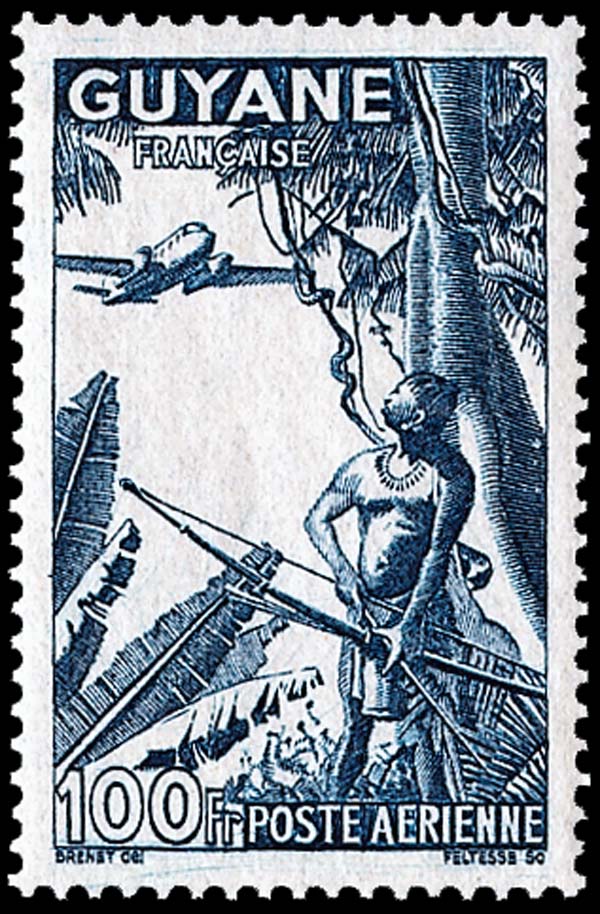 Issued in 1943
Issued in 1943
Is this a case of bureaucracy gone mad? With the new constitution of Vichy the colonies had to have new stamps, so new stamps were produced regardless of the circumstances. Possibly. Another explanation presents itself, though, continuing to make work like this shields the workers from conscription for slave labor in Germany. The stamp designers, the stockmen, the inkers, the suppliers of ink, paper, and glue, the auditors all become essential workers in the Vichy administration. With this make-work perhaps some Frenchmen were protected from the dreaded Service de Travail Obligatoire.
‘Particle Fever’ (2014)
Driven by the pack instinct of nerds, we went to the Dendy Newtown to watch ‘Particle Fever’ about physics. The star of the show was the Large Hadron Collider at CERN (Centre Européenne pour la Recherche Nucléaire) in Geneva.
The focus of the 100 minutes was the alternative explanations offered by theoretical and experimental physicists. The commitment of the individuals portrayed to pursuing ideas and testing them was inspirational. All the more so, considering the diversity of their background and formative experiences.
The theoretical issues were well enough explained to keep interest. The mix of interviews, exposition, graphics, background, and images of that Collider kept us engaged. Though much of it was in the form of extended selfies, and that got thin. A super nerd talking to an iPad camera is not entirely captivating.
The search for evidence of the Higgs Boson particle provides the drama, and there is a lot of it, including a meltdown. That Peter Higgs is there to see it was touching, affirming, and delightful.
 The theoretical matrix in which Higgs Boson is crucial
The theoretical matrix in which Higgs Boson is crucial
Along the way are messages about the importance of basic research which everyone wants and no one wants to fund. The clips of United States congressmen defaming such research is sobering, though the conditions of unfettered thinking that physicists at the Institute for Advanced Study at Princeton enjoy is the obvious counterpoint which left in silence.
Also left in silence is the engineering that built that sucker, and the endless political work that must have gone into securing, maintaining, retaining, perpetuating, and using its funding.
 Look closely at the people in the bottom left for perspective
Look closely at the people in the bottom left for perspective
This is a film about the actors on the stage, the physicists, and not about the stage machinery that made it happens. More’s the pity, because the people who made it happen also include all the politicos who sold the project, and continually re-sold it to keep those Euros flowing.
My visit to Geneva years ago took me to the League of Nations archives where I read 3×5 index cards from 1939. Now I know what I missed!
‘Softly dust the corpse’ (1960) by S. H. Courtier. Recommended
A fine krimie by an Australian writer, this and his other books too long out of print. This one was originally published in London as ‘Gently dust the corpse.’ Why it was changed from ‘Gently’ to ‘Softly’ is anyone’s guess.

It offers the classic setup of an group people isolated from the outside world with tensions among them, in this case at Tyson’s Bend on the Old(est) Hume Highway between Melbourne and Sydney near Mildura in the 1950s. The tensions spring from a missing lottery ticket worth £100,000. So far so ordinary.
Tyson’s Bend has a petrol pump, a general store, a pub, a school, and perhaps a population of 200.
What sets this work apart is the additional character of the dust storm that cuts cuts off Tyson’s Bend from the outside world, making driving impossible and bringing down telephone wires. While most of the townfolk shelter at home about a dozen take refuge in the pub where, thanks to a generator, the beer remains cold. These people are the syndicate that bought the lottery ticket which has won, but before they can collect the dust storm hits, hits hard, and keeps hitting.
The wind howls and cracks, the dust is invidious and insidious, getting through every crack, slit, hole, and into everything from eyes to drinks. It just goes on and on, shaking the roof, ripping doors open, cracking windows, overturning cars, blowing detritus with force, making a walk from one house to another as dangerous and difficult as such a walk in an Antarctic winter. Even in the pub, dust swirls in the air and coats and re-coats every surface. Makeshift face masks and dark glasses are essential to venturing outside and they add to the mystery.
 The dust of the Red Centre
The dust of the Red Centre
The dust clogs and carpets everything from eye brows to clothing. There is no escape and no relief from it. It is like a bombardment without end. The setting is marvellous and far more dramatic than comparable efforts by the dean of Australian krimie writers, Arthur Upfield. The storm is a malevolent force even greater than the murderer within the ranks, and far more destructive.
 A dust storms envelops Melbourne
A dust storms envelops Melbourne
The characters are well defined; The nervous school teacher, the bullying policeman and his subdued wife, the simple store owner whose clever wife runs most things in town, the barman who plays the clown, the jackaroo who keeps to himself, and the two city lawyers who are trapped there. It seems one member of the syndicate is determined to murder the other members to get the lottery ticket!
I learned a new word ‘bombilation’ (p. 180) which is very old and means to buzz. Here it refers to the incessant noise of the storm.
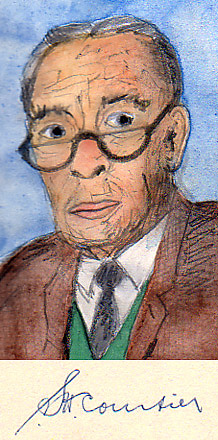 S. H. Courtier, school teacher by day
S. H. Courtier, school teacher by day
I read several other of Sidney Courtier’s books in the 1970s and liked them. There a great many others, though out of print, and so not easy to come by. There is a good entry for Sidney Hobson COURTIER at AustcrimeFiction.org
Barbara Nadel, Arabesk (2001) – Recommended
This is the third entry in this long running krimie series set in contemporary Turkey. The title refers to a style of popular music that seems to parallel country and western music, and not the elaborate decorative style known as arabesque. There are fifteen novels in all and I have read four or five others.

The protagonist is Inspector Çetin Ikman and his homicide team in Istanbul. In this entry the earth moves, more than once, but only in slight tremors as Europe and Asia once again collide at the Bosporous, as one of the characters observes.
Some of the cleavages of Turkish society are mirrored in the story, West (urban, rich, and European) vs. East (rural, poor, Asian), religious (Muslim, Jew, Yezidi, Christian), social (wealthy and servant), and ethnic, too, Turks, Ottomans, Kurds, and an expatriate. The distinction between Turk and Ottoman has to do with social status but their is also an ethnic patina to it, it seems, the Ottomans are taller, lighter of skin, etc. than the Turks. The expatriate is a half-Irish doctor who likes the life in Turkey but not the way women are treated, and that is another cleavage in the story. Men go out and about, and women stay home in the kitchen.

Nadel’s krimies are guide books to Turkish society with a plot that brings together the individuals who embody these lines of demarcation. To say it that way makes them sound didactic and that is not the case. The books are lively and walks through the streets are vibrant, exotic, and sometimes frightening.
Always in the background for young men of draft age is Turkey’s continuous conflicts along the Iraq and Syrian borders and in Cyprus. These conflicts may be low level but conscripts get killed in them every day. Everyone knows this happens but the Turkish news media seldom reports these events.
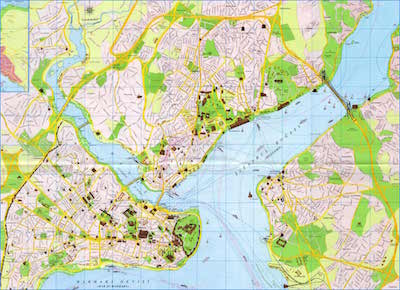
In this entry Ikman is on sick leave but sitting at home doing nothing is depressing so he gradually insinuates himself into an investigation led by his subordinate, the tall, urbane, handsome, Ottoman, Mehmet Süleyman. In contrast, Ikman is short and dark, and very Turkish. Worse, Ikman is half-Albanian, a cross that he never escapes.
 Barbara Nadel
Barbara Nadel
Sometimes the stew is too rich for this reader. No doubt the names are all authentic but, as in those 19th Century Russian novels where everyone has three names, I found it hard to distinguish and remember all the names that come up in the early chapters. The references to the different quarters of Istanbul mean nothing to me, but I should have the wit to find a map to follow the action. Everyone smokes, more or less continuously.
Arabesque evolved, says fount Wikipedia, to interest the eye while not depicting human or animal forms, respecting Allah’s power of creation and destruction of these beings.
Huey Long, ‘My First Days in the White House’ (1935)
It is now commonplace for presidential candidates, even early in pursuit of party nomination, to publish a book. Most of these campaign books are autobiographical of the ‘My Story’ sort. John McCain offered ‘Faith of My Fathers’ (2000) gently reminding readers and reviewers of his sacrifices. Mitt Romney in ‘No Apologies’ (2010) tried to make himself seem ordinary but special at the same time. Barack Obama in ‘The Audacity of Hope’ (2008) and Hillary Clinton in ‘Hard Choices’ (2014) have bowed to the convention. A host of lesser known candidates have had their ghost writers, too, briefly putting their names before the reading public in book stores. (As always, Hillary overachieves and has several other titles to her credit.)
In the current fashion these books emphasise the intangible, the character of the candidate. Seldom do they focus on problems, programs, or goals or have the intellectual content of, say Richard Nixon’s ‘Six Crisis’ (1962).
When the campaign book became an essential is hard to say. Since the 1960s it has become a fixture. Semi-literate candidates who have never read a book, now write one!
In 1936 a campaign book was not commonplace; Long’s ‘My First Day in the White House’ was unusual in its time and place.
Long’s plan was to support an independent spoiler (Father Coughlin) with no chance of winning in the 1936 campaign to split the Democratic vote and elect a Republican, who would be unable to respond to the Great Depression, leaving the Republicans discredited and the Democrats without a leader by 1940 and the country desperate. Then Huey P. Long would accept a popular draft to take the Democratic nomination. During his short time in the United States Senate Long had begun to organise the spontaneous draft that was supposed later to impel him to the Democratic nomination. Huey never left anything to chance and he worked for the longer term.
This book, incomplete at his death, was a declaration of his intention. The custom at the time was for senators to declare their candidate for a presidential nomination at a press conference in the Senate cloakroom. Never one to follow form, Huey Long did it in this book.
In the hectic life he led, Long dictated this manuscript in 1935 in Washington D.C. where he was a senator from Louisiana, and Baton Rouge in Louisiana where he ran the state through a stand-in governor, often in cars, taxis, and hurrying from one meeting or speech to another, and on the train on his national campaign for his ‘Share our Wealth Clubs.’ He worked 24/7, getting by with four hours sleep most nights.
Long had one simple proposal that the ‘Share our Wealth Clubs’ expressed. Tax the rich! TAX the rich! TAX THE rich! TAX THE RICH! Get it?
It is more than taxing income, by the way, it is was also seizing the fortunes the rich had already amassed. The word ‘confiscation’ was not used but that it what it was. Compared to this spectre, Franklin Roosevelt was a bastion of the establishment.
But what of the book? It has an impish humour that is attractive, and a subtlety of mind and insight into the motivations of others with which he is seldom credited, but which he must surely have had to be as successful as he was. Like many other successful politicians he understood what motivated his opponents and how to manipulate that rather as a sailor learns to tact into the wind.
In these pages President Long hits the ground running, publicly naming a cabinet on inauguration day without bothering to inform those named! It is just what he would have done. He named, among others, Herbert Hoover to Commerce and Franklin Roosevelt to Defense. They could of course decline, but then they would have to explain to public opinion why they refused to serve their country in these roles! Now that is audacity. Needless to say in these pages, they comply with that great god public opinion in the person of its prophet Huey Long.
The millionaires resist but are won over through appeals to their better natures, long term self-interest, and Christian charity. That Baptist ascetic John D. Rockefeller was the first to surrender his fortune to the greater good. His fortune is a pittance compared to J. P. Morgan or John Hill but they, too, succumbed to saviour Long. In short order. Morgan and Rockefeller are redistributing their wealth and ohers’ in a ‘Leviticus’ jubilee.
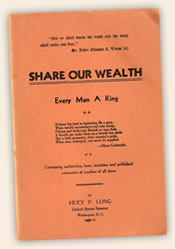
The only tension is this parable occurs in Chapter Six when an unnamed governor stirs up popular resistance to Long’s initiatives. Long does what Huey Long always did, he goes to face down the crowd, and wins them over. The governor is contrite, saying he led the revolt, to force the Supreme Court to rule on Long’s many initiatives, which it did found and them all good.
The initiatives include nationalising the railroads (calling William McAdoo from retirement to reprise his World War I role as Tsar of the rails), endless funding for agriculture, education, and health, combined with a balanced budget (thanks the confiscation of the fortunes of the Robber Barons). After token resistance, everyone agrees with Long’s vision.
Most of the book is told through dialogue in meetings or letters. There are illustrations he commissioned as the work evolved. This one for example.
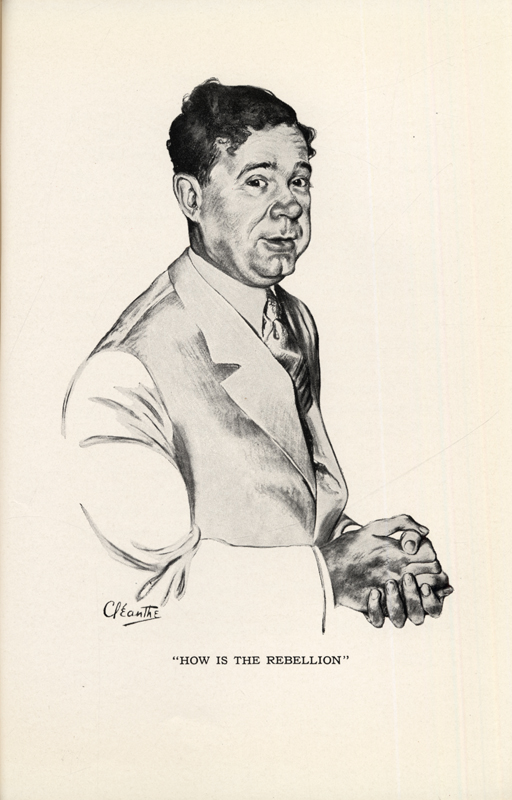
There is none of brow-beating, blatant bribing, sale of offices, strong-arm tactics, double-dealing, and threats, or beatings that fuelled his gubernatorial administration in Louisiana in these pages. It is a redeemed Huey that figures here now that he has ascended to the White House.
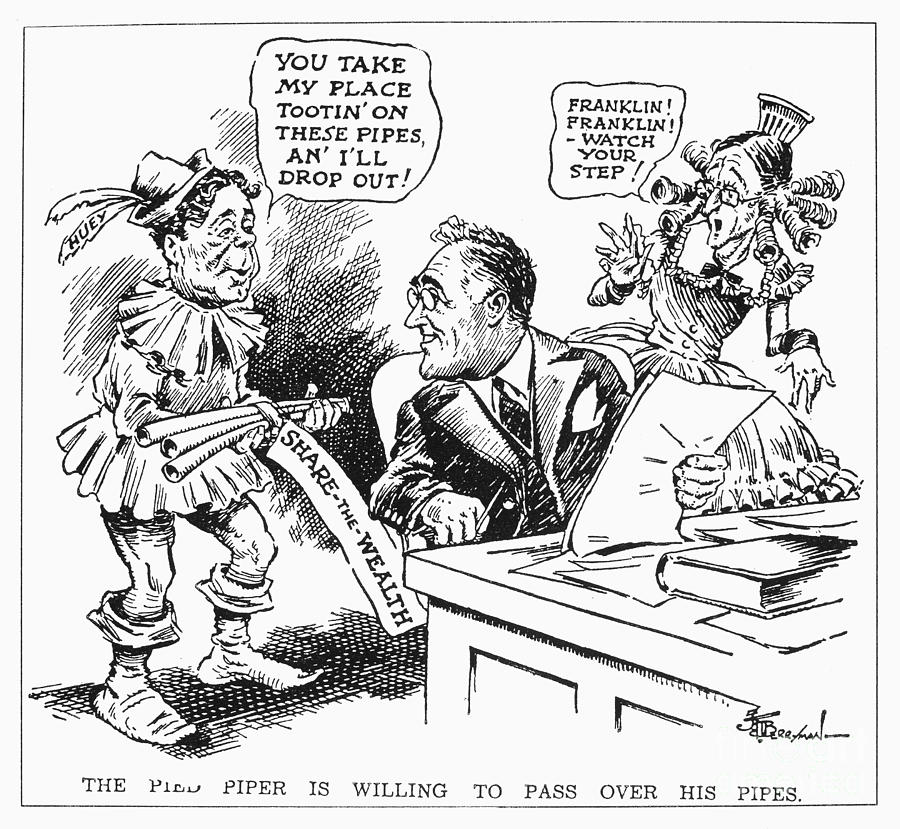
It is easy to parody the book these generations later, but in the late 1930s with the Dust Bowl suffocating six states, thousands displaced through foreclosure, hundreds of thousands of jobless men wandering the country, hardship without end for a decade, and against the backdrop of President Roosevelt’s tentative first efforts, placed within the organisation of the ‘Share our Wealth Clubs,’ the book would have been a lightning rod for both hope and despair, one that Huey Long would have wielded expertly. Of that there is no doubt.
The book offers a complete social vision, albeit supeficial, as naive and as inspiring as many utopian fictions. It shows the working out of the idea without any of the inevitable reaction, undermining, half-heartedness, and confusion of life. It compares to Edward Bellamy ‘Looking Backward’ (1888) or William Morris’s “News from Nowhere’ (1890).
‘Kirby Smith’s Confederacy, The Trans-Mississippi South, 1863-1865’ (1972) by Robert Kerby
Class, time for another quiz. Get those eggheads ready! Agitate those little grey cells!
In the 1860s, who…
1.negotiated treaties with foreign governments and corporations without any political authority?
2.created an elaborate parallel federal bureaucracy with no constitutional authority?
3.practiced state socialism?
4.monopolized trade?
5.seized private property to the tune of $30,000,000 in gold?
6.exercised the executive authority of a president without any political mandate?
7.abrogated habeas corpus in the pursuit of conscripts?
8.and did all of this over the area of Missouri, Arkansas, Louisiana, Texas, New Mexico, Arizona, eastern Kansas, and Oklahoma to the loyal supporters of the Confederacy?
All those who said General William Sherman in his famous March to the Sea, on with the dunces’ caps and look at a map!
All of this was done for more than two years (1863-1865) by forty-year old full General Kirby Smith, of the Confederate States of America army. How that came to be, why it happened, what he did and how are laid out in this fascinating study of a corner of American political history quite unknown to this casual Civil War buff.
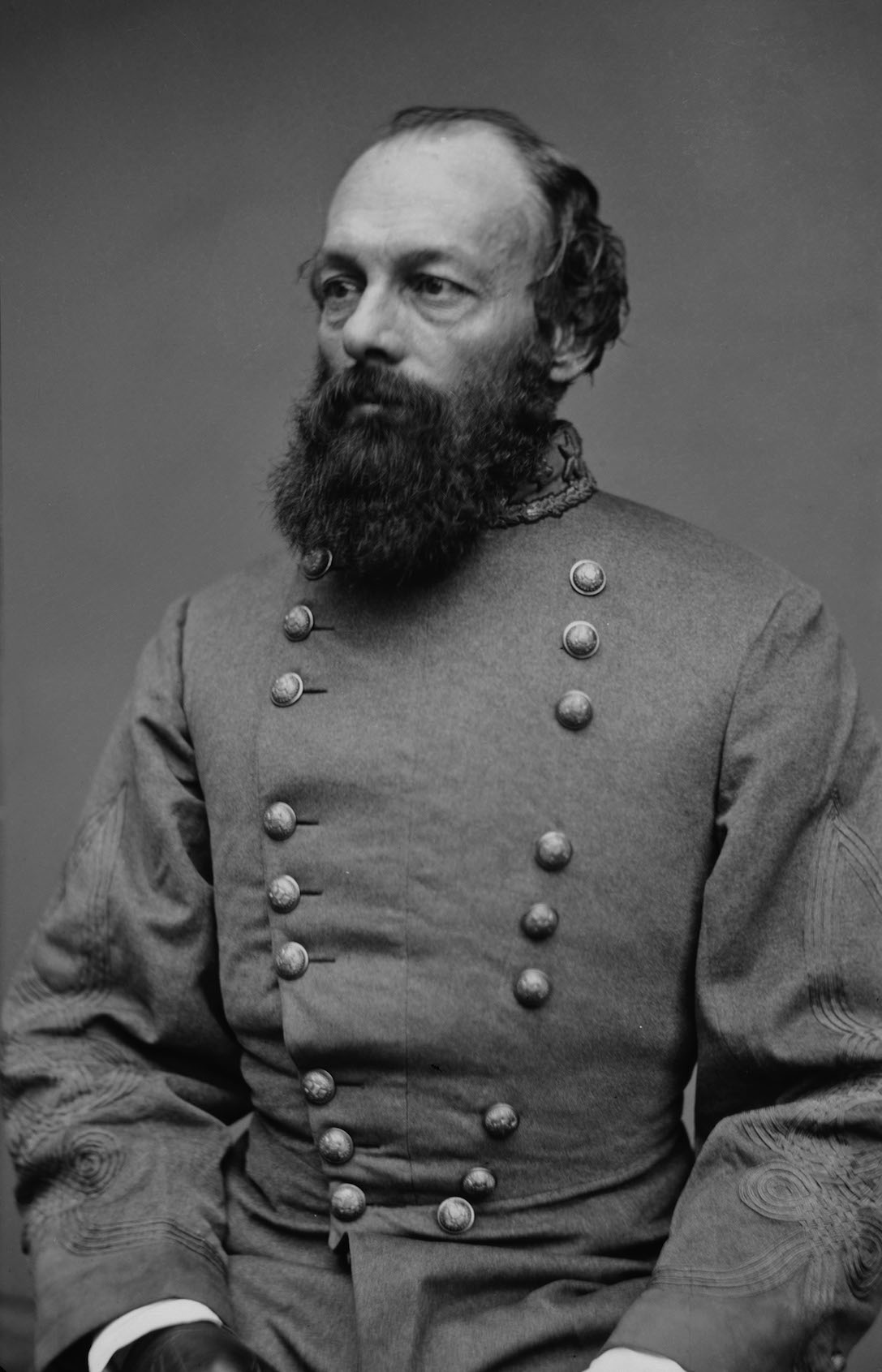 General Kirby Smith
General Kirby Smith
I had long known that the youthful General Smith had commanded Trans-Mississippi Confederacy though I was never quite sure I could find the Trans-Mississippi on a map. I now know it comprised four states (Missouri, Arkansas, Louisiana, and Texas) and four territories (Arizona, New Mexico, Kansas, and Indian [Oklahoma]).
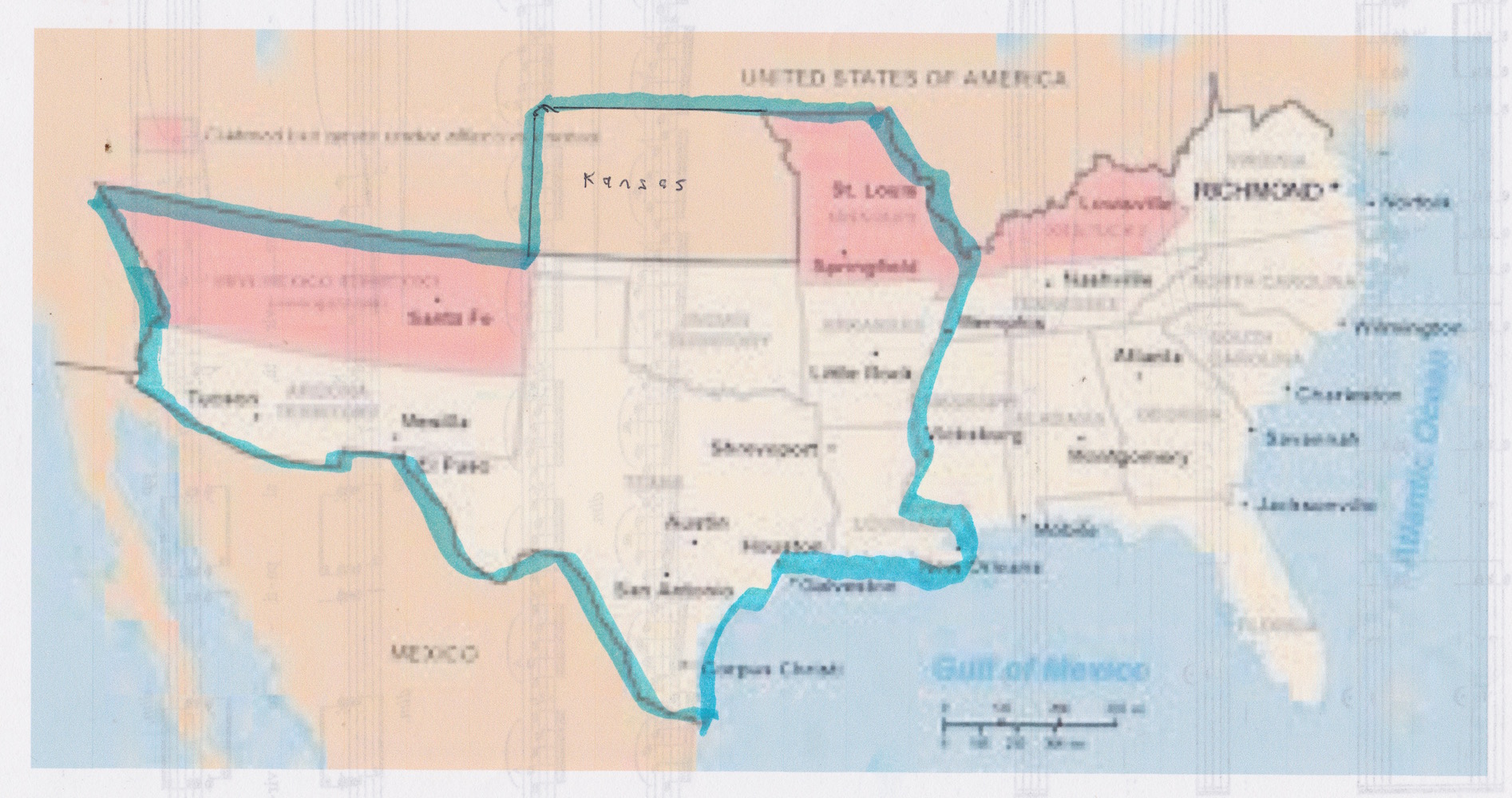 The blue line encompasses the field of operations of the Department of Trans-Mississippi Confederacy.
The blue line encompasses the field of operations of the Department of Trans-Mississippi Confederacy.
His army, such as it was, was the last major force to lay down its arms in June 1865 as the news from the east made its way west. But knowing that was to know nothing of the detail.
After reading some other biographies of presidentials in the Civil War period I was reminded of Smith’s domain and decided to find a book about it. Pay dirt!
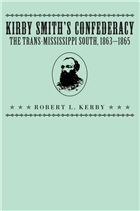
Not only does the book produce the goods on Smith and the Trans-Mississippi it makes the point that without the title or the legitimacy that goes with it, he exercised the prerogatives of a super-president unbalanced by a legislature and unchecked by a judiciary for two years. See that list of eight points above. If President Abraham Lincoln or President Jefferson Davis had done any of these, the opposition would have been great. Indeed, for what it is worth, Davis did none of them and Lincoln did only one, habeas corpus – he put a lot of people in jail indefinitely on the suspicion of sedition without trial. A lot. He provided a precedent for George W. Bush and Guantanamo Bay that was never cited!
First to that name ‘Trans-Mississippi’ for those who did not read Caesar’s ‘Gallic Wars’ ‘Cis-Alpine’ means on this – ‘cis’ – side of the Alps, and ‘trans’ means…? Yes, Class, on the other side of the Alps. Now apply that to the Mississippi.
No, Dunce, Caesar did not cross the Mississippi River at Rubicon! Do pay attention.
Cis-Mississippi is east of the Mississippi River and Trans-Mississippi is west of the Mississippi River. (Except in Des Moines Iowa where I repeatedly find on Skywalk maps that east and west are relative terms not fixed.) Now that we have nailed the name, let’s go to the man.
Kirby Smith (1824-1893), born in Florida, was a West Point graduate and a gentleman scientist whose collection of botanical specimens acquired while serving in frontier forts in Texas can still be seen in the of Natural History on the Mall. He served under Braxton Bragg in the Confederate Army of Tennessee and when his accomplishments made Bragg look bad, he removed him from command in one of this many fits of jealousy. Smith was thus available at the right time to go West in January 1863. The theatre he commanded was the biggest in space assigned to a general officer in either army and the means he had to defend it ranked the smallest on any measure. He said he liked a challenge, and off he went with a devil-may-care wink.
Within six months it got a harder. The Confederate stronghold at Vicksburg surrendered and in a few weeks the Mississippi River became a Federal lake, impassable to Confederates. Smith was now on his own, with very limited, very difficult communication with the Confederate government in Richmond. Intrepid individuals rowed skiffs, canoes, rafts, and logs across the Father of Waters bearing messages. They might wait weeks for Federal patrols on the River to move on, slacken, or be called away to a diversion before daring a night crossing. Anyone who has seen the current in the Mississippi above the Delta knows that this is a life-risking exercise. Many messages and some messengers were lost to the River, to Union patrols, and to self-preserving second thoughts.
At first Smith dutifully asked for instructions case-by-case from Richmond but after July he sought a carte blanche which in a series of agonising messages travelling this long, dangerous, uncertain route from Richmond to his headquarters in Shreveport Louisiana or Marshall Texas President Davis did not say ‘no’ to the request but then did not say ‘yes’ either. For equivocating, President Davis could give the Japanese lessons.
Finally, Smith just focused on Davis’s sentences that seemed to authorise him to do what Smith deemed necessary and ignored all the qualifications, asides, limitations, hedges, cross-references, hesitations, definitions, and the fog of indecision that Davis’s pen exuded. One reason Davis obfuscated was that he, as President, did not have the powers Smith wanted to exercise, a fact of which Davis was made constantly aware by newspaper editors, Confederate Congressmen, and state governors who enveloped him.
Smith’s forces were desperately short of war material (ammunition, firearms, gun powder, pack animals, cannon, shot and shell, uniforms, boots for the men and shoes for the horses) but most of he was short of men. Periodically he would launch an enlistment campaign offering such inducements as he could (immediate furlough and an enlistment bounty in worthless Confederate dollars). Desertion was astronomical, one division reported 300 men fit for duty and 4,500 absent without leave. To stop that he would take troops from contact with the enemy and set them to find deserters who would then be shot on the spot as a lesson to others. This was hardly an appealing duty and members of those patrols often themselves deserted. It was a downward spiral.
The best way to avoid conscription was to enrol in the state militia (which remained true during the Vietnam War; think George W. Bush). The state militias’ registers were bursting with names and for each name there was an exemption. None of the states had the capacity to arm these militiamen with any more than the farm shotguns they brought with them. Few states had officers who could drill and discipline them, and since the officers were elected (per the state constitutions), any officer who tried too hard was defrocked. Moreover, a state militia cannot go outside the state (again by the state constitution), limiting cooperation with others to nearly nothing. While Smith’s armies regularly opposed forces four or five times larger, vast numbers of able bodied men of soldierly age had their exemptions, and these very same men urged Smith to fight to defend their homes and property (slaves) from the Yankee scourge. It did not take long for this circle of irresponsibility to wear out Smith’s good humour. With no legal or political authority but the weapons of his press-gangs, he forced militiamen into the ranks. Of course some of them deserted and sicced governors and newspaper editors on to him, and a host of trial lawyers brought endless suits. He persisted with some success.
To pay his army, to pay civilians for their labor as teamsters or ditch diggers, to buy uniforms, ammunition, and everything else he need a source of such goods and he needed money. The source was obvious. Look at the map above. México! There were plenty of Méxican entrepreneurs to supply whatever was needed. Then the problem was the Readies to pay for it. The only resource of value he had at hand, and he had at hand plenty of that, was cotton. In warehouses, on farms, in sheds there were hundreds and thousands of bales which had built up when the Union occupation of New Orleans stopped the trade through that port. Those who owned the cotton would not, however, sell it for Confederate dollars. Smith tried bonds; he tried his own warrants; he offered interest on the Confederate dollars – no sale!
What was a general to do?
He seized it. In some operations 60,000 bales were impressed by his troops in one day. ‘Impressment’ is the fancy word for stealing with a gun in return for a chit of paper. Get this in perspective, the price of cotton on the world market was very high. One or two bales would be worth a fortune to a private solider. Yes, there was private enterprise among the ranks and not all the cotton seized entered the lists on Smith’s accounts. Even so, in one calendar year he sold cotton for $30,000,000 gold dollars in México. By the way, there is no evidence, none, that Smith enriched himself in this trade.
 Cotton bales
Cotton bales
He started shipping cotton to México under armed escorts (yes, some owners formed posses and came after their crop) and he was in business. He created a Confederate Cotton Office and this bureaucracy identified, compensated (seized) crops, stored, shipped, and sold it. To do so it acquired (seized) wagons, mules, harnesses, reins, and teamsters (who were conscripted on the spot). States’ rights, habeas corpus, private property did not figure in the equations. His assertion of authority went beyond even presidential powers.
In addition, to keep the wheels turning on this enterprise much was needed, wagons, wheels, tackle, yokes, horse shoes …. Smith set up foundries and factories to manufacture all this. Soon there was a Confederate Army tannery turning out leather for harnesses, an ore and refining foundry for horse shoes…. To manage these affairs an Office of Army Supply was created that socialised all of these works. There were many objections, and law suits were spun, letters of complaint slowly found their way to President Davis’s desk in Richmond, and he would in turn chide Smith in a letter received eight months later. On the rare occasions when Smith received an explicit and direct order from Davis to cease an activity, he obeyed exactly.
In short order French armament corporations started swapping cannons for cotton along the Rio Grande. There was an increasing French military presence in México at the time and many French field officers found they had rifles, saddles, horses surplus to requirements which they swapped for cotton. The entrepreneurial spirt blossomed.
While England and France had limited sources of cotton in their empires, the mills of New England had ground to a halt for the want of cotton. Sure enough purchasing agents from New England were soon buying Trans-Mississippi cotton along the Méxican border. That is, they did not buy it but swapped it for Colt revolvers, ammunition, Remington rifles, steel knives, cassons, harnesses, heavy serge uniforms in grey which they brought with them from New England. That is right. In fact prior to the closure of New Orleans many of these … businessmen had been doing this since 1861, and they were merely relocating the trade in 1863 to the Rio Grande.
One result of this trade with New England was that the Confederate troops in the Trans-Mississippi were often armed with the latest weapons, just as the their Union counterparts received them, too. A shipment of 10,000 repeating rifles to New Orleans would be split, 5000 to stay and the other 5000 shipped on to México and Smith’s procurement bureau. Then when a Union cavalry patrol armed with Remingtons went out to blast Rebels, they quickly discovered the Rebels had the same rifles, and blasted back.
Since Napoléon the French had been leaders in artillery. The French sold cannons to Smith’s agents. Accordingly, Smith’s troops had better, though fewer, cannons than the Union forces they encountered. Better in that they were more accurate and easier to re-load.
To manage relations with México, France, Britain, and the New England traders Smith created his own State Department which negotiated agreements, exchanged agents, and so on. Everything was in writing. He made treaties with both Méxican and French authorities to pacify the border for this trade. Not only was he trading with foreign countries, he was trading with the enemy.
Nonetheless, his command often suffered privations because making or buying the material was one thing, distributing it over the vast reaches of the Trans-Mississippi with its few railways, many fordless rivers, its animal-track roads, disrupted raids by Federal cavalry was hard.
Cotton iconography features on nearly every Confederate bank note to remind the world of the white gold. On this five dollar note the overseer sits atop a horse with a whip in hand, ready to increase efficiency by using it on the blacks picking the cotton. All the while Lady Liberty on the lower left serenely observes. Most Confederate currency portrays blacks, too, always busy and happy at their work.
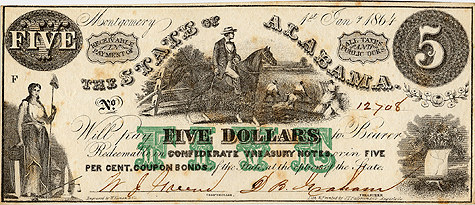
A good part of the book is taken up with accounts of military manoeuvres, battles, campaigns which make appalling reading. The size of the forces involved are microscopic compared to either the Virginia or Tennessee theatres but the death, the cold endured without shoes, the dying, the amputations, the disease, the swarms of stinging and biting insects, the gangrene, being constantly wet in the bayous, the malnutrition, the blinding heat, the field of rotting dead men are just as real.
The governors of each of the states and territories wanted Smith to defend every foot of their jurisdiction, the more so when the Union occupied most of a state. Missouri had to be defended, then recovered. Arkansas. Louisiana. Missions impossible, those. The Union picked and poked around looking for easy opportunities using the control of rivers to roam far and wide, supplemented by large bodies of cavalry riding on well-fed horses.
New Mexico and Arizona were the route to California gold and very early in 1861 Confederate expeditions went through Death Valley toward that El Dorado. Nature – it is called Death Valley for a reason – hostile Indians, and some Union army posts were enough to stop that. Even so there was a Confederate governor-in-exile and in the Confederate House of Representatives in Richmond sat a delegate from the Confederate Arizona Territory. Kansas figured as a continuation of the Jayhawk War and a refuge for raiders into Missouri, including the infamous William Quantrill (1837-1865), Jesse James (1847-1882), and other thugs later made into celluloid heroes. Slaughtering defenceless civilians was the preferred vocations of these men, e.g. Lawrence Kansas, not encounters with Union army patrols. There was also at least one raid into Colorado.
The Indian Territory (Oklahoma) was home to Cherokee Indians, regarded as the most civilised savages for they had adopted many of the white man’s ways: clothing, newspapers, slavery, and political representation. They negotiated an alliance with Kirby Smith against promises of future autonomy, i.e., no state of Oklahoma.
Apart from the shreds of papers affirming this alliance, it was embodied in a brigade of cavalry consisting of Cherokee and Creek Indians led by Brigadier General Stand Watie (1806-1871) himself a Cherokee, which remained loyal to the Confederate cause through thin, thinner, and thinnnest.
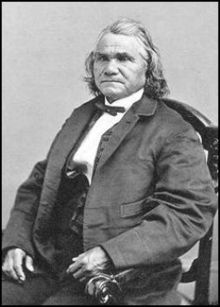 Stand Watie, Brigadier General C.S.A.
Stand Watie, Brigadier General C.S.A.
It operated independently, and mostly in today’s Oklahoma and disrupted Union communication and transportation, and occasionally joined one of Smith’s armies for a combined operation like the invasion of Missouri and then Arkansas. This brigade was one of the most reliable in Smith’s command.
While Texas was not often a scene of combat, when it was General John Magruder showed once again his tactical acumen and held off the threats made, including some French sabre rattling from México which Magruder saw-off in short order. In Arkansas General Richard Taylor did the bulk of the fighting in the Trans-Mississippi with the little wherewithal Smith could supply. He, too, had a tactical mastery that allowed him to overcome the odds often, but not always. On the debit side Generals Theophilus Holmes and Sterling Price made a mess of anything they turned their hands to, and Smith’s efforts to promote them to some harmless station, preferably in Cis-Mississippi, did not secure the support of President Davis, until it was too late.
By March 1865 a means of regular, albeit hazardous, communication had been established between Richmond and Smith at Shreveport. While the Confederacy was crumbling, the Confederate War Department launched an inquiry into the staffing Smith’s command. There were too many generals on the payroll! (Never mind that none of them, nor anyone else, had been paid in sixteen (16) months and then only in worthless Confederate dollars.) In an exchange of letters Smith was required to account for his every general and his duties in detail. Considering the vast distances within his command, he was not over-generaled, but try convincing the paymaster of that by letter.
So does the tail wag the dog.
Ever the dutiful soldier, he prepared the report but in the end he did not submit it. Why not? Because the War Department ceased to exist a fortnight later. Love it? The ship of the Confederacy is sinking, water is everywhere, and the head of payroll division sits grimly at his desk as the ship goes down demanding an explanation for those damn paper clips in the Trans-MIssissippi! It is the principle that is at stake!
As news of the surrender of Lee and then Johnston was broadcast in the Trans-Mississippi the scattered remnants of Smith’s garrisons, independent brigades, and armies evaporated. In some cases the local commander went to the Union line to surrender with some formality, but in most cases the Johnny Rebs walked away into the night. Smith surrendered formally at Galveston, and then took himself and his family off to México, because by that time, Lincoln had been murdered and the future was dark. He returned in late 1865.
He became a professor of botany and taught at the University of the South in Sewanee, Tennessee for almost thirty years.
Conclusions? The author draws five conclusions from the study, and they make all the detail fall into place very nicely. However, I do wish they had been outlined at the start so I could have borne them in mind as I read.
1.The Confederacy conceived of the Mississippi River as a boundary, not a highway. Dividing commands at that boundary split forces that would have been better combined as the Federals proved repeatedly along the Father of Waters. This was the major strategic error. This decision divided command at the River, and then required explicit orders from Richmond for any cooperation across the River by Confederate forces on the two sides. More often than not, Richmond could not decide at such a distance what to do, and even if a decision was made, the communication was very poor. I trace this reasoning back to the general conception of military departments (matching state boundaries) which in turn paid court to states’ rights in the Confederacy.
2.Despite the hardships, the Trans-Mississippi Department sustained itself agriculturally and economically. It supplied the army with the necessities and civilian life went on. Though worn down and worn out it went on. The major problem was not production of the necessities of life, it was rather the distribution on the primitive roads, a problem compounded when the Mississippi River was closed.
3. Spared the extensive damage of general warfare experienced in Tennessee, Georgia, and Virginia, its armies never suffered a decisive defeat, yet the Trans-Mississippi did suffer a collapse of morale which was apparent in 1864, well before Lee’s surrender. That surrender was the the end of this collapse not the beginning. Kerby’s evidence for this collapse is ingenious.
4.Contrary to the conventional thesis that the ideology of states’ rights defeated the Confederacy from within, in the Trans-Mississippi General Smith worked effectively with the state governments in most ways, most of the time. Certainly, there was no Georgia in the Trans-MIssissippi, Georgia being the state that – some say – did more to defeat the Confederacy of which it was part then any other factor, except possibly South Carolina!
5.In the Trans-Mississippi the erosion of morale (see 3 above) that culminated with Lee’s surrender started very early in 1862. The initial cause was not defeat on the battlefield anywhere but the mobilisation of men and economy for war through conscription and impressment. Though everyone bore it, it sapped energy, enthusiasm, and spirit. Subsequent defeats sped the erosion but did not start it. Not sure what to make of this one. Again Kerby finds evidence, over looked by others, to sustain this thesis.
Robert Kerby
‘Alexander Stephens of Georgia’ (1988) by Thomas Schott.
When those who preferred compromise to war passed away, there remained those men of principle who preferred war to compromise.
Stephens had two brushes with the presidency. At one time the Little Giant of Illinois, Stephen Douglas, toyed with asking Stephens to be a vice-presidential running mate. Later the Secession Convention in Montgomery Alabama selected him to be Vice-President of the Confederate States. Indeed, he had even been mentioned as a president in the first days at Montgomery before Davis emerged as the preferred candidate.
Alexander Stephens (1812-1883), after a career in law, was a state legislator and member of the United States House of Representatives, where he was embroiled in the collapse of the Missouri Compromise, the Compromise of 1850, the Kansas Jayhawk War, the continuous crises that led to the Civil War.
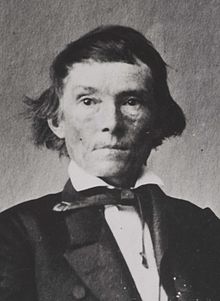 Stephens in 1855
Stephens in 1855
In his own mind Stephens was a pillar of virtue, a man of unblemished rectitude, absolutely consistent and forthright, unwavering, and never mistaken. He was also pivotal and influential in all matters he touched. That is his own opinion. He had no self-knowledge, it seems.
Schott shows in this well researched and nicely written book that Stephens was inconsistent, illogical, marginal, and often ignored. That Douglas briefly considered him as a running mate indicated how desperate Douglas was to hold together the Democrats as national party, spanning North and South, and how few Southern moderates there were that he might recruit. That he became Vice-President of the Confederate States is because more important players had contempt for this ‘empty compliment.’ Like most vice-presidents, Stephens found there was little for him to do.

Stephens was barely 5’ 2” tall and never weighed more than 100 pounds. He suffered ill health all of his days, and was often incapacitated for months at a time. He spoke in a shrill and high-pitched voice. Nor was he favoured by appearance. In today’s media he would never make it in politics.
He was a prodigious letter writer, and a finder of legal loopholes that made his legal career, an autodidact, who was as pompous as he was short. He had the intellectual vanity of a PhD.
When Jefferson Davis arrived in Montgomery to accept the presidency, he and Stephens met frequently. In those days, just as the assault of Fort Sumter occurred, Davis proposed a three-man commission North to negotiate a peaceful secession and asked Stephens to head it. Stephens declined because of ill health, he said at the time, and because, he added in hindsight years later, he saw no chance of success. Outliving many rivals, Stephens added much hindsight to his record; the the author does a good job of evaluating that hindsight against reality, seldom to Stephens’s credit.
While Davis and others argued that secession was a right to reconstitute a government, unconsciously aping John Locke, Stephens, ever in love with the sound of his own voice, delivered a paean on the divine justice of black slavery in his infamous Cornerstone Speech. That speech, widely reported and reprinted, lit a fire in the abolitionists of the North; even if Abraham Lincoln had been inclined to entertain the Davis peace commission that speech made it impossible. Stephens, the Vice-President of the Confederate States said that the purpose of secession was to defend slavery! He said further that it was a God-given right to enslave others. Moreover, that speech registered with the European powers Davis had been trying to convince to support the Confederate cause.
The author implies that Stephens’s speech was not intended to set a policy, but simply that when he started talking and mentioned slavery, the audience cheered, so he laid it on to milk more cheers from the audience. The author leaves little doubt that Stephens often talked without thinking. Before the death tolls mounted crowds North and South cheered all manner of claptrap. Don’t know what ‘claptrap’ is. Think Tea Party. Got it? Got it!
The Montgomery convention established a provisional government on the condition that the president be elected in one year. The critics of Jefferson Davis were legion. Some things never change and every newspaper editor in the South knew better than Davis how to conduct the government and wage a war, and said so often and in 30-point type. Even so, there were no other candidates; Davis (and with him Stephens) were re-elected unanimously. I cannot find out any more about this election from Wikipedia. There seems to have a popular vote of some kind and an electoral college vote.
What a utopia it would be if we were governed by the philosopher-journalists of the media who know everything.
He and Davis were much alike in their overweening egotism and thin skin, and when the government moved to Richmond, Davis no longer consulted Stephens. Accordingly, Stephens went home and spent most of the war in Georgia, and Georgia contributed as little to the war as possible.
Some historians say that Georgia made war on the Confederate government in the name of states’ rights. Georgia withheld men and material from the Richmond government on a significant scale. It stymied efforts to raise money with Georgia cotton and refused to cooperate with the Confederate Navy’s efforts to run the Union blockade, all in the name of states’ rights. Georgia Governor Joseph Brown won over Stephens with transparent and superficial flattery who then joined him in attacking his own government. Stephens could see no inconsistency in this behaviour. He never considered resigning, but continued to enjoy the status of being ‘Mr. Vice-President’ while disloyally opposing that government he formally served.
The Northern press fastened onto to this show of disunity with glee. European diplomats took note of this disunity, too.
The Confederate Constitution followed that of the United States very closely. It differed, however, in giving cabinet secretaries a seat of the House of Representatives where they would be subject to scrutiny. Schott accepts without examination Stephens’s claim to making this innovation, but the balance of evidence gives that honour to Judah Benjamin, the Attorney-General. (Benjamin had seen this practice in his travels to England.) In the event it seems not to have had any impact and it did not last since most cabinet secretaries stayed as far away from Jefferson Davis as possible by leaving Richmond.
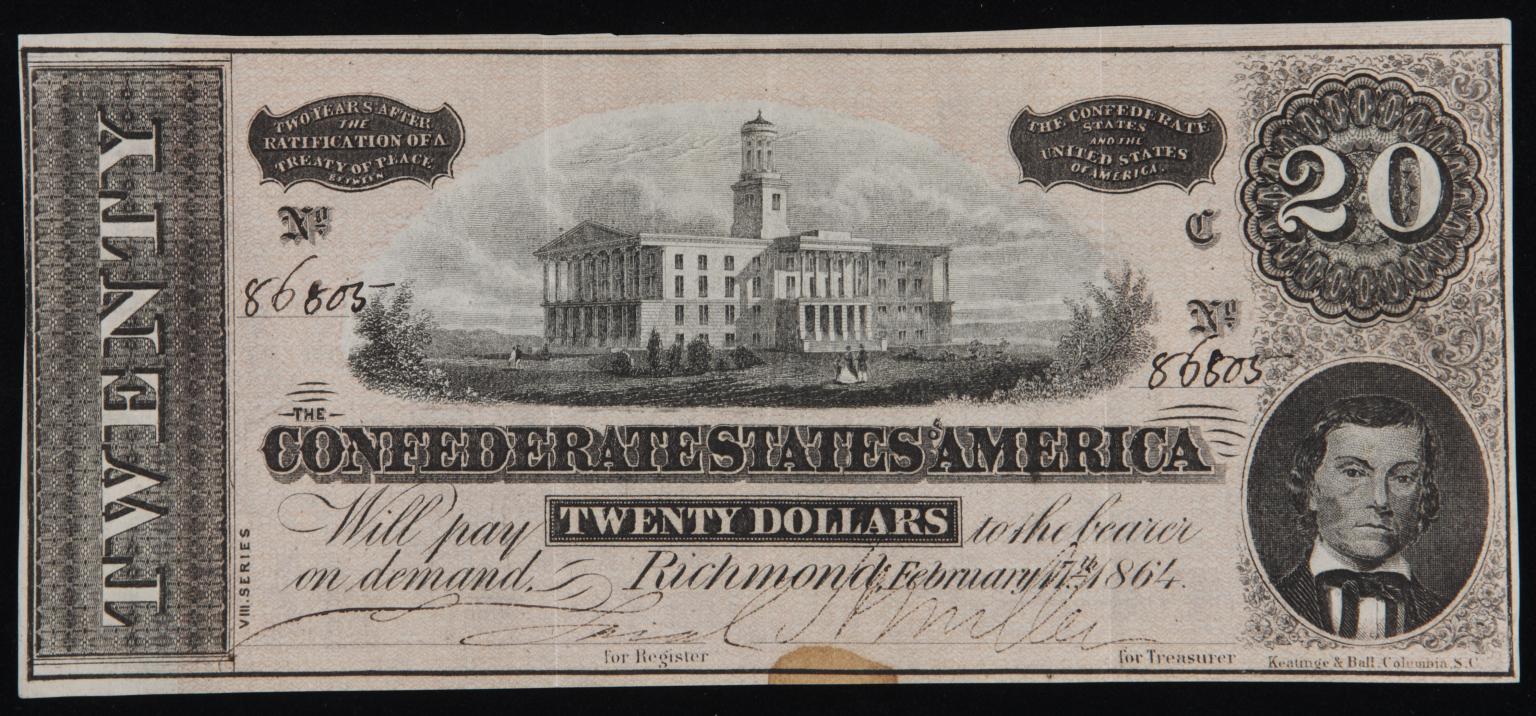 Stephens on the Confederate $20 note which in 1964 would have bought a toothpick. The Confederate government printed about $1 billion dollars in notes, and most of the Southern states also issued their own script, then there were the bonds. In addition to inflation at the time, another result is that they have little value to collectors because there are so many of them. (Readers may remember that in the 1950s the judge in Carson McCullers’s ‘Clock without Hands’ had a stash of these notes which he proposed to put back into circulation to solve the economic problems of the day.)
Stephens on the Confederate $20 note which in 1964 would have bought a toothpick. The Confederate government printed about $1 billion dollars in notes, and most of the Southern states also issued their own script, then there were the bonds. In addition to inflation at the time, another result is that they have little value to collectors because there are so many of them. (Readers may remember that in the 1950s the judge in Carson McCullers’s ‘Clock without Hands’ had a stash of these notes which he proposed to put back into circulation to solve the economic problems of the day.)
Stephens never married and women are rarely mentioned in his extensive correspondence. He would say that he gave himself wholly to his country as a patriot. Did I say ‘pompous’?
While he fancied himself the only Christian gentlemen the country he did not attend church, though he read the Scriptures, and none of his opponents ever threw that in his face on the stump. Odd that. But he was not alone, e.g., Andrew Jackson.
Stephens’s political career started as a Whig, as did Abraham Lincoln’s. They sat together in the Whig caucus in Congress. As the Whig Party collapsed, unable to span the regional divides of North and South and of East and West, Lincoln became the second Republican presidential candidate, while Stephens sided for a time with Stephen Douglas as a Democrat. Class! Who was the first Republican nominee?
A pedant? His first election to the United States House of Representatives was as a member at large from Georgia, which had not yet been divided into Congressional distracts, because its western border was not surveyed. In his first speech in Washington D. C. he declared his own election invalid since the Constitution expressly required Congressional Representatives to be elected by districts of nearly equal size. He was satisfied with the startling effect on the few who heard it and did not act on his own contention, say, by resigning. By the way, the districts were surveyed and in two years he was re-elected from a district.
At the end of the Civil War Stephens was arrested and jailed for four months, the first two were pretty hard but the last two were lax. After his release he was a United States Senators-elect from Georgia but since he had not taken the loyalty oath, he was not allowed to take his seat. Later, after taking the oath, he was elected to the United States House of Representatives for ten (10) years where he served without distinction, and then briefly – less than a year – governor of Georgia.
In this post-bellum years Stephens proved (to his own satisfaction) that he had never erred, that he had opposed slavery, that he upheld the United States Constitution, that he had the right war policy, and more. His capacity for self-delusion had no bounds. That old adage about a person being promoted one level about the level of competence came to mind in his case. In the confusion of wartime, his promotion was several levels above his competence.
The book is meticulously researched and written with a light hand. It gives credit where credit is due to Stephens, e.g., he did visit wounded soldiers in Richmond hospitals now and again, something that Jefferson Davis could never bring himself to do because he thought it was inconsistent with the dignity of his office. After all, one of those hill-billy soldiers might not address him as ‘Your Excellency’, which the only form of address he found suitable for his high station! The book also points out Stephens’s volatility, repeated mistakes, lies, and more.
My one complaint though is that the there is no terminal chapter with a final, overview assessment of Stephens after readers have forced-marched through 520 pages of detail. A bigger picture at the end might give that details some added meaning. Without that picture a lot of that details seems, well, detail for the sake of detail.
A ticket of Douglas and Stephens would have give the wits something to talk about, for example, the Leprechaun ticket or the garden gnome slate at 5’ 6” and 5’ 2” respectively.
De Gaulle: The Ruler 1945-1970 (1985) by Jean Lacouture.
The story goes on, and gets even stranger. Although de Gaulle was wildly popular in France at the Liberation, the restoration of political parties, particularly the Communist Party which was taking orders from Moscow, made political life unpalatable to de Gaulle. This Fourth Republic from 1945 to 1958 was a replay of the Third Republic, divided, carping, jealous, each undermining the other for momentary advantage, negative, inward looking, oops starting to sound like Canberra. All this began while the Germans still occupied ten percent of the country. The parliamentarians had forgotten nothing and learned nothing.
Colonel Trinquier, one the leaders
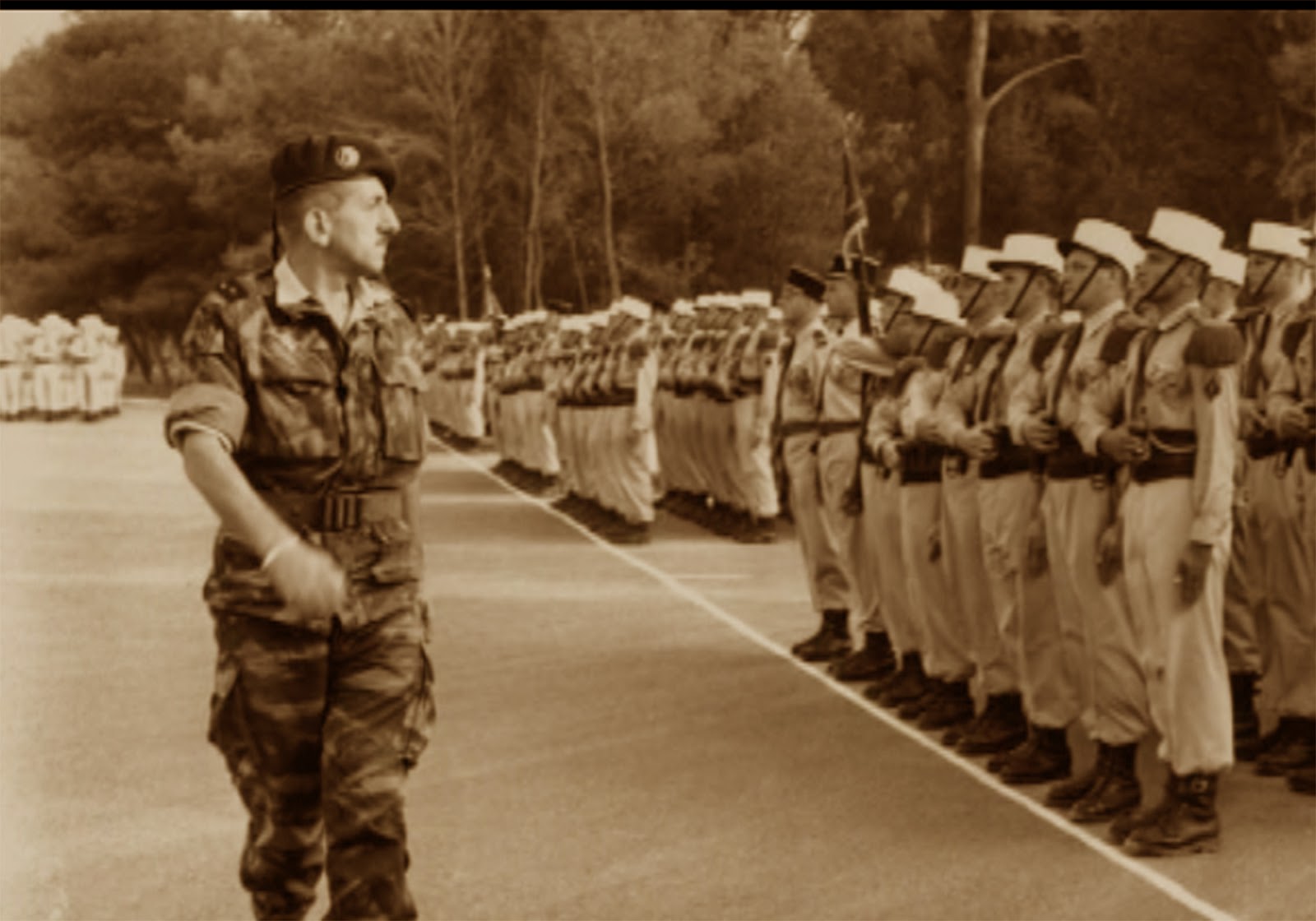 General Massu and his paratroops, a pivotal actor
General Massu and his paratroops, a pivotal actor
Many of these ’wolves in the city’ (a reference to Paul Henissart’s book of that name) knew de Gaulle personally but they did not seem to know him at all. He had been on record since 1943 for self-determination in Algeria, yet they thought he would re-impose French domination there. By the way, there is plenty of evidence that a coup d’état was likely. Two regiments of paratroopers from Algeria were emplaned for Paris, and another regiment deemed loyal to the plotters was assembled in the Bois de Boulonge on the designated day. Tense!
Historians make careers in speculating about de Gaulle’s role in this plot. Lacouture concludes that he knew something as drastic as this was in the offing, and probably thought it would take such a dire threat to bring parliament to its senses, so he remained mute, allowing the plotters to think he was with them. That rare quality in a politician is the ability to keep quiet and say nothing, and de Gaulle had that.
The call was made and de Gaulle was sworn in as prime minister, that cooled the plotters who relented, standing down the paratroopers in Algeria, though there is an amusing story that two police officer riding bicycles through the pre-dawn Bois coming upon a regiment of a thousand fully armed paratroopers very early in the morning and ordering them to disperse, which they, lacking any further orders, did! Now that is civilian authority.
De Gaulle proposed the Constitution for the Fifth Republic which gave a president great powers and took that office by an indirect election. An indirect election? Political Science students know what that means but most punters do not. It means, in this case, that 80,000 office holders (municipal councillors, mayors, parliamentarians, and members of the judiciary were the electorate in this first presidential election under the Fifth Republic. They gave de Gaulle a two-thirds majority against a field of six other candidates, including the inevitable Communist. In the subsequent parliamentary elections it was another two-thirds for the supporters of de Gaulle, though by this time there were two Gaullist parties. The Communist Party nearly disappeared in this election, going from 120 seats to 10. Such indirect elections were the norm in the 19th Century well into the 20th Century.
De Gaulle remained faithful to his belief that circumstances determine all, and on Algeria he stalled, delayed, spoke in enigmatic phrases, while wooing first Algerian nationalists and then moderate generals in his own army, now and again offering a dissident general a plum appointment abroad as ambassador, promising others new commands if only the crisis could be resolved, coaxed parliament to defer to him, and took his time. During all of this he came to realize himself that there was no alternative but complete independence, though he had long preferred a more gradual option that retained a filial link, and finally he said so.
Then there was a coup d’êtat attempt, but by this time the plotters were too weak, too divided, the government too strong, the Algerian nationalists too disciplined, and having anticipated this, de Gaulle out manoeuvred them.
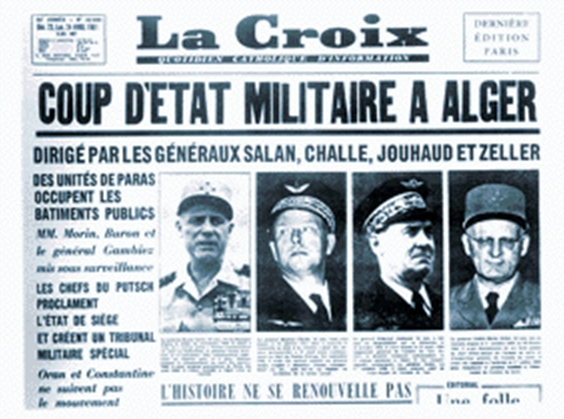
That led a fruitless and bloody civil war between the Organisation de l’Armée Secrète (OAS) – the ultras – and France, which was just as merciless and bloody as the repression in Algeria had been. None of this story is pleasant, but in the end a worse result, which was very likely at several stages, was averted and de Gaulle, love him or hate, must be credited with that. No one else could have done it.
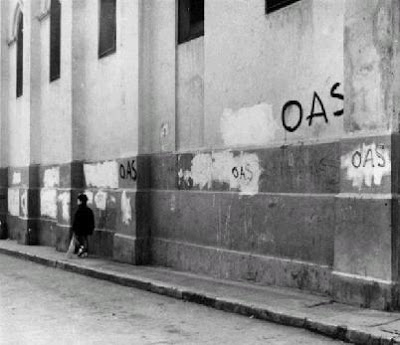
Nor was any of it easy. Men who had been close to him for years turned against him. Others tried to kill him, several times; nothing he did satisfied the liberals, the nationalists, the Communists, the pied noirs of Algeria…. When he stalled and delayed lives were lost. It was a terrible time, and the OAS brought the war to Paris by bombing cafés. Yes, long before the IRA got around to blowing up customers drinking coffee, the OAS did it in Paris. It was all deadly serious. At the height of this struggle de Gaulle was seventy (70) years old. Reader what will you be doing at 70?
In 1965 he contested his only popular election and won 55% of the vote in the now familiar two-step process. He defeated François Mitterand.
Having learned how unreliable allies were in World War II, President de Gaulle hewed an independent line in foreign and defence policy. When England tried to prevent a European Union, De Gaulle committed himself to it as a third force between the Anglos and the Communists. Later when the United Kingdom wanted to join the European Union…. Likewise he wanted France to be a force to be reckoned with from now on, and that meant nuclear weapons, and developing these weapons could only be done outside NATO, so France left NATO.
Originally he wanted to occupy the east bank of Rhine, exact reparations from Germany, monopolise the coal from the Saar, and dismember Germany, if not quite as ruthlessly as Clemenceau proposed in 1918, but de Gaulle changed his mind. He originally wanted to manage the movement to independence of colonies, but he changed his mind. He originally opposed a European Union, but he changed his mind.
Instead of reducing Germany, de Gaulle led the way in bilateral relations with West Germany. In one remarkable instance he gave a speech in German at a factory in the Ruhr in which he challenged his auditors to do something very hard, very unlikely, never been done before, virtually impossible…to live together in peace! I did once find it on a web site but I have since lost the address.
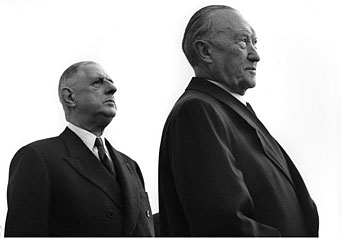 de Gaulle with Konrad Adenhauer
de Gaulle with Konrad Adenhauer
It is a common mistake that I have read in that self-important organ of opinion the Sydney Morning Herald more than once and heard on the ABC pulpit more than once that the demonstrations of May 1968 drove de Gaulle from office. In fact he left office in 1969, as always in his own time and in his own way. But what is a year to a journalist? Just another annoying fact, or so I was told by a Fairfax journalist when I pointed out this mistake.
In fact in the elections de Gaulle called after those demonstrations in June 1968 returned 352 Gaullist out of 487 seats in parliament. A resounding victory! In fact he resigned in April 1969, when he was seventy-nine (79), after the defeat of a referendum he sponsored on the reform of local government. He was ready to leave and the referendum was a convenient trigger. He died within a year.
A few loose ends. De Gaulle assigned the earnings from his memoirs and other books to the Anne de Gaulle Foundation that he and Yvonne started. The Foundation supported mongoloid children and their parents. The pygmies of the press give this gesture no publicity.
While head of the provisional government, prime minister, and president de Gaulle paid his own way. That is he charged almost nothing to the state. He paid for his own telephone calls. He had meters installed in the living quarters so he paid for the heat, water, and light there. Paid for his own postage stamps. We know this from biographers. He lived on his pension as a colonel; his promotion to general had not been confirmed by the Reynaud government during its flight and so was never technically consummated leaving him entitled to a colonel’s pension which he accepted without demure. Nothing was said about it at the time. I am not sure what conclusion to draw from his frugality except, as always, that he did things his way.
In the preface to this translation the author complains that the publisher abridged volumes two and three into a single tome. The original French three volumes were squeezed into two by combing the last two in one with much editing. It is not clear who did the editing. Was it the translator or the author himself? What I can say is that I found the blow-by-blow account of the political machinations from 1946 to 1969 is far more than I could digest in even this abridged form. What that detail does do is show how hard the work of politics is.
What I missed, and I do not know if it is there in the original, is detail of de Gaulle’s years in the wilderness. After all it was twelve years. He gave some speeches in the early years and he wrote his memoirs, yes, but what else? Did he reassemble his family? Did he go to his grandchildren’s christenings? Did he read a biography of Jean d’Arc? She by the way seems to me to be his alter ego. Whereas she heard God, he heard France.
Since his passing many politicians, parliamentarians, parties, and movements in France have said they are Gaullist. What does that mean, ‘Gaullism’? First, it means an independent foreign policy and that implies having the means to be independent. Second, it means planning and co-ordination in domestic policy. In economics it means Keynesianism. Finally, it means the expansion and defence of French language and culture along with social conservatism. In short, big government, big enough to please Gough Whitlam.
There is a plaque on the wall of a building in London at Carlton Gardens noting that De Gaule had an office there during the war. Virtually every word on this plaque is contentious. To Vichy he was not a general; his commission lapsed when he refused the order to surrender. When he set up an office in Carlton Gardens he was alone. The Committee came much later and by then de Gaulle’s headquarters had moved. Likewise, that well known term ‘Free French’ renders ‘France Libre’ which is much broader – Free France, not just some Frenchmen but the whole. Moreover, in 1943 when the Anglos were trying to displace de Gaulle they started using the term ‘Fighting French’ to undermine him. In 1940 there were no ‘forces’ with de Gaulle.
I long wondered about the 140,000 French troops evacuated from Dunkirk in May. Should de Gaulle have recruited them. He could not because they were transhipped from Dover to Bristol by train in a great hurry and shipped back to Bordeaux arriving just before the capitulation. At the time the ambition was to get them back into the war, since no one in England, least of all the French generals with the troops, anticipated a capitulation in June. It was Churchill who ordered the British to evacuate soldiers from Dunkirk without regard to uniform. Until he intervened the evacuation was limited to Brits. Thereafter, the evacuation included Brits, French, Belgians, and even some Poles who with the French.
Christopher Koch, ‘Highways to a War’ (1995)
The novel is a study of war photographers in South East Asia in the 1970s. The three principals are Jimmie Feng, Dmitri Volko, and Mike Langford; the last is the protagonist. Mike is from Tasmania and there is where I got this copy in 2014.
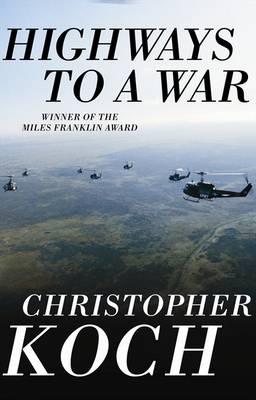
The descriptions of life and war in South East Asia are etched, and at times lyrical, the heat of the day, the bird song before sunup, the sapping humidity, the blinding sun, the people rooted to the land, the cool of the night,contrasted to the blare of American Saigon, the wumps of helicopters, the paralysing fear and chaos of a firefight, the confusion of battle, the mistrust of those people rooted to the land. It is all there in a kaleidoscope of sounds and colours. Much of the book can be read for a vicarious ride into the world of these war-lovers, as per the John Hersey novel.
The first experience of combat is terrifying. Enduring a B-52 bombing is unendurable. Volkov’s drunken lament is moving. The political theory seminar, complete with references to Hegel, in the jungle is compelling.
Mike is a Christ figure trying to save just about everyone and finding that he is all too human, too frail to do that. Indeed his unremitting inarticulate goodness wore down this reader. Even more tedious was his universal sex appeal; it read like an adolescent boy’s wet dream. Still worse was the recognition of his gift of grace in the early pages. The world does not work like that.
This reader was also worn down by 511 pages many of which were repetitious, first Vietnam and then Cambodia, each the same story told twice. Koch may have had to write it to exorcise his demons but I did not need to read it, and the second telling is lesser for my want of attention. Yes, I turned the pages ever faster.
 Christopher Koch
Christopher Koch
Niggles, there were a few, I do not know what a ‘Tasmanian bluey’ is and neither did the Tasmanians I asked. I have never seen it spelled ‘tzarist’ before and neither has the spell checker. The many references, including some in the Launceston setting at the start of the novel, to the Australian Broadcasting Service in the 1970s made me wonder where the ABC was. By the way, we never do get back to Launceston despite the elaborate setup. I also stopped short at a reference to blue eyes in old photograph of a great grandfather. Do the arithmetic and that great grandfather’s photograph must have been in black-and-white.
I chose this book because I have read other Koch novels and trusted him on two counts, to have a story to tell and to tell it well. He met both those criteria despite my niggles and plaints.
Jean Lacouture, ‘DeGaulle, The Rebel 1890-1944’ (1984)
When people hear that I am reading about Le Grand Charles most have a dismissive reaction as if to say ‘That fool!’ or worse. I get no such reaction to reading about Adolf Hitler or Erwin Rommel.
Does the memory of his veto of the United Kingdom’s bid to join the fledgling European Union still rankle? Does his icy reception of President Kennedy in Paris still itch? Does his determination to make France independent by (1) withdrawing from a NATO commanded by Americans and (2) developing nuclear weapons make him a villain?
That seems to be the superficial reaction. I say ‘superficial’ because I doubt any of these reactors know much of French history or his biography. This book offers a lot of both. As a foretaste of what follows, here are a few reasons by de Gaulle had no faith in the Anglos.
1.The British tried repeatedly to oust Free France from Syria and Lebanon when the Vichy Administration there collapsed.
2.The British colluded with the Americans for two years to displace de Gaulle with another, more pliable figure head. As to pliable see (5) and (6) below.
3.Whenever de Gaulle’s insistence that France was an Ally became too annoying the British would literally turn off his telephones, deny his vehicles petrol coupons, and end take-off and landing rights for the aircraft he used for transport in England and North Africa.
4.The Roosevelt Administration continued diplomatic relations with Vichy regime well into 1944, while that regime was busy deporting Jews to Germany.
5.Free France was excluded from all the planning of D-Day and the invasion of France in June 1944. ALL.
6.The American plan was to occupy France as though a belligerent and install military governors.
The list could go on but that is enough to indicate the sore points. To see some of the context read on.
When he decided to be a soldier, Charles de Gaulle grew up. His earlier dalliances with poetry and the life of letters fell away. His adolescent indolence and insouciance stopped from one day to the next. His indifferent school work suddenly became excellent. He is another example of Prince Hal or Achilles, a man born to the sword. Once committed to the Army, De Gaulle never looked back. He entered St. Cyr by examination and worked his way up from 150 in a class of 200 to 12. No one doubted that in another term he would be first. When he graduated he chose the infantry, unlike his peers who preferred engineering, artillery, or cavalry, each more glamourous than les poilus.
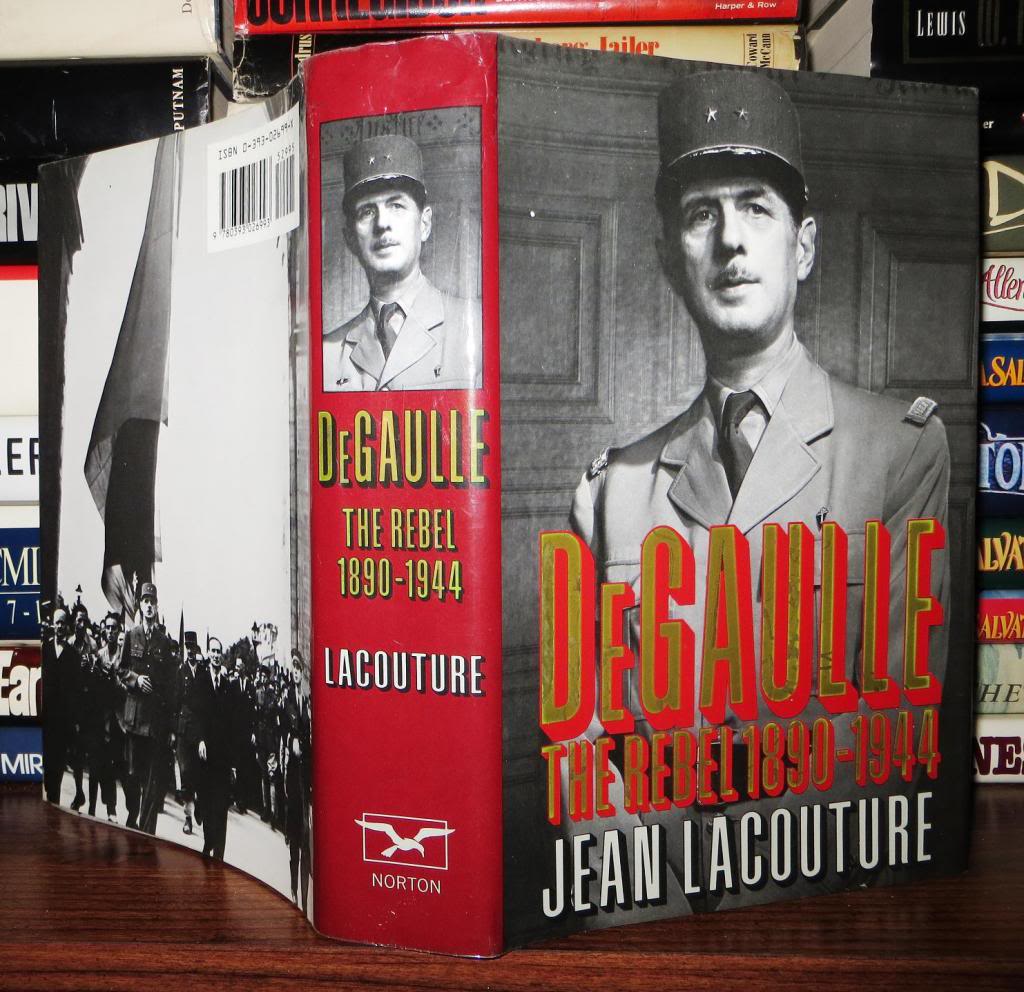
At 24 World War I started and de Gaulle was a captain at the front, shot in his first engagement. When his unit was transferred to the defence of Joan of Arc’s birthplace, sacred Verdun, he rejoined it there and served under the command of General Phillipe Pétain who praised young captain de Gaulle in dispatches. De Gaulle was bayoneted and captured, spending nearly three years as a POW in Germany. He had studied German since high school and he studied it again to aid his numerous, unsuccessful escape attempts.
In the long months of captivity he studied Germany and Germans in every way he could. He read the newspapers, spoke to and listened to the guards and the civilians who worked around the jail. He drew two conclusions from this study: (1) a civilian government mobilizes a country better than a military government because it is responsive to citizens and (2) Germans are resilient despite bad government.
For the moment stress the first, the primacy of civilian government. There is no doubt that de Gaulle, despite everything said about him by his many enemies, was a child of the French Republic and viewed it as the best form of government. He was never tempted by dictatorship of any kind under any name.
Wherever he went Charles de Gaulle had a mind of his own which he spoke. This characteristic slowed his progress up the army hierarchy but it also won him the support of Marechel Phillipe Pétain, such is the irony of history. Though he and Pétain were never close, Pétain made use of de Gaulle’s talents and protected him from some of the enemies de Gaulle made all too easily.
Prior to World War I the major debate in the French army was between the advocates of fortifications and those of firepower. Pétain took the side of fortifications and he found vindication in the killing fields of World War I. Firepower was so great it could not be overcome. Sheltering on the defensive in forts was the only solution. Out of this seed grew the Maginot Line.
De Gaulle drew a different conclusion, though he agreed that firepower was irresistible, his conclusion was maneuver, mobility, and movement. Hence his interest, even while a POW, in tanks.
After World War I the debate become more abstract. The received opinion in France was that war had to be managed through a series of doctrines that computed firepower, ratios, bullets per man,feet of cement walls, angles of fire, lines of wire, kilograms of steel in fortifications, ever more technical, mathematical, and abstract. A Cartesianism gone mad that René Descartes would not have recognised. Everything must be planned and calculated far in advance, then the army ants move like clockwork according to the plan, directed from afar by telephone and radio, observed from above by airplanes.
De Gaulle rejected this approach period, and said so in the first opportunity when he, then a junior officer, addressed a seminar of very senior officers who had all supped on doctrine. Rather he argued that it was circumstance, the unanticipated opportunities, that led to victory. These are first and best perceived at the lowest level of command, the sergeant, not in a manual of doctrine or at the end of a telephone wire in Paris. He advocated an army based on sergeants! At this rank the French Army should recruit educated and stable men, retain them with good pay and conditions, and train them (map reading, codes, signals) so that they could recognize opportunities and take initiatives. Hardly what the demigods of the École de Guerre saw as their mission. That Moltke the Elder, Napoléon, and Caesar could be quoted in support of this thesis helped not at all. Off de Gaulle went to distant posts in Poland, Germany, and Syria. Had World War II not intervened he would no doubt have been assigned to the French Antarctic Territory.
To make matter worse, de Gaulle wrote and published one book after another, each contrary to doctrine. By the way in this writing he earned a reputation as a stylist of the first order. To read ‘Le fil de l’épée’ (1927) is to see why. It is spare, terse, laconic, and elegant. It emphasised the human element in combat not the technical; it stressed the concrete not the abstract. It argued that the soldier wins the battle at the edge of a sword, not the general at the end of a telephone line. The general trains and motivates the soldier, and directs operations in broad.
Not only was de Gaulle a democrat of the French Republic, he was never anti-Semitic, not even in the casual way that was common in those days. There are many examples of this kind of anti-semitism that mar Georges Simenon’s Maigret novels of this time. Some of de Gaulle’s mentors in the army were Jews, and he always remembered them. Moreover, Léon Blum from his prison cell in Vichy declared de Gaulle to be the leader of France.
Then the war came, and de Gaulle was plucked from a desk and assigned to a field command of light tanks. Within days of arriving, he launched a reconnaissance in force and engaged the Germans with some success and took several hundred supermen prisoners. This is one of the few initiatives shown by any French officer during the Phony War (September 1939-May 1940). His superiors chided him for riling the Germans and relieved him of command! Gallic logic.
Then in May, German General Heinz Guderian struck with Erwin Rommel in the lead, proving that the Ardenne Forest was not impassable, which had been the assumption of the French General Staff, proving that massed tanks can destroy an enemy contrary to the doctrine of static defence.
De Gaulle, promoted to brigadier general, was assigned to command a makeshift brigade of French tanks. With this scratch force he launched the only French counter-offensive of the war to cut Guederian’s communication slowing the German advance. Like Churchill and Hitler, de Gaulle had been under fire in World War I, and, unlike them, he had also been under fire in World War II, several times at the edge of the sword.
By this time the chain of command was disintegrating. Premier Paul Reynaud asked him to join the government to balance the defeatist that surrounded him, e.g., Pétain, who had been advocating an armistice for days. Reynaud sent de Gaulle to London to motivate the English into making a still greater commitment to France.
Between 1932-1939 there were fourteen (14) minister of defence. Each busy undoing the work of his predecessor as the government lurched from one crisis to another.
That old chestnut that people unite against a common enemy is belied in this story.
Even as the Germans were flanking Paris in June 1940, Generals Maxim Weygand and Maurice Gameilin were undermining each other and writing letters to prove that the defeat had nothing to do with them. In one very embarrassing episode Weygand prowled the halls of the Ministry of War trying to get cabinet ministers and generals to sign a petition exonerating him of any responsibility. Comic opera, but for the gunfire.
Churchill was tempted to do more in France but he was surrounded by officers who told him France was lost and it was necessary to preserve British forces for the coming battle of Britain.
Then in a master stroke that has since faded from history, Churchill offered to unify France and Britain as a single nation, with a single government, and to defer to Reynaud as head of that government, if only the French would fight on in France or take the government into exile to London or Algiers. Reynaud was ready to accept the offer of union but his cabinet, by this time meeting in the Bordeaux town hall, was defeated, and rejected the offer in a few minutes. Better to make peace with the Germans than to enter into a covenant with perfidious Albion!
Like many others who emerge as leaders, the deeper the crisis became, the more disastrous the situation, the calmer, cooler de Gaulle became. At the last joint meeting of the Anglo-French War Council, Churchill described de Gaulle as imperturbable, relaxed, and yet alert and — most of all — with a plan….! The plan was a far-fetched (a redoubt across the Breton peninsula, but he was the only Frenchman at the table with positive action in mind, indeed, the only one to make eye contact with the English. The others stared down at the table top in silence. Beaten men, they were defeated. When Churchill passed de Gaulle leaving the room he paused and said to him ‘Vous êtes la France.’ Little did either of them know what was to come.
Though commissioned to ask what terms the Germans would offer, Prime Minister Pétain instead declared a unilateral ceasefire in his second day in office, and capitulated to the Germans with no effort to negotiate or permit the government to choose exile as the Dutch, Danes, and Norwegians had done in preceding weeks. Some say that Pétain’s actions were thus illegitimate.
In London two days after the capitulation de Gaulle went to the microphone in defiance of the obvious facts that France was lost; in defiance of the government of Pétain; in defiance of a great deal of public opinion in France that the war was over, and thank God for that! In defiance of the French community in London which wanted nothing so much as a low profile.
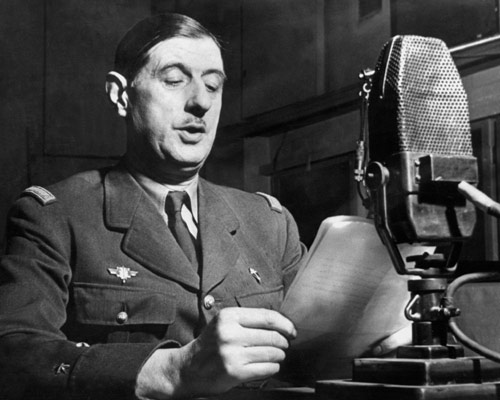 ‘France has lost a battle; the war goes on!’
‘France has lost a battle; the war goes on!’
There is much more to tell but it is best read. Instead of going into those details, let us take a look at the man himself. He married Yvonne, he said, because she had the best mind. He read most of his manuscripts to her, when possible, and accepted her judgement on style. His daughter Ann was born mongoloid and thereafter much of the family life revolved around her. There was never any question that she, Ann, would be secreted away in an institution though that was the common practice at the time. To the extent possible Ann would have an ordinary life with her siblings. His sons all carried arms in the Free French military.
 Anne de Gaulle, ‘Maintenant elle est comme les autres.’
Anne de Gaulle, ‘Maintenant elle est comme les autres.’
Second only to Yvonne was lifelong influence of his father and then his brothers. They were a close knit clan and stayed that way. The adverse publicity that Charles brought to the name of de Gaulle was worn as a badge of honour. By 1944 the Vichy Regime had rounded up all of his relatives and they were deported to German slave camps. That included his elder sister, cousins, nieces and nephews, and few of them survived the ordeal. Is it any wonder that later he refused any truck with the Vichy Regime, despite the insistence of President Franklin Roosevelt. Non!
De Gaulle, the rebel, has an impressive CV.
1.In 1912 a very junior lieutenant de Gaulle advocated mobility in a unit commanded by Pétain that singular proponent of fortifications.
2. In 1917 Captain de Gaulle lectured senior field officers on the stupidity of ‘attack at all costs’ against machine guns which many of them had ordered.
3.In 1924 Captain de Gaulle published articles in both popular and technical journals arguing that circumstance determines success, contrary to the French Army credo of doctrine. He is sent to Poland as an observer.
4.In 1927 he lectured future generals on the importance of sergeants in combat, not High Command.
5. In 1928 Captain de Gaulle refused to comply with General Pétain’s demands for intellectual flexibility. He is posted to Syria.
6.In 1934 Captain de Gaulle published a book opposing the doctrines of High Command predicting that the next war will be won by massed tanks supported by aircraft which will punch through any defensive (Maginot) line.
7.In 1937 he published yet another book disputing the doctrines of high command against the express wishes of Pétain.
8.In 1940 de Gaulle mailed a tract denouncing the conduct of the war to 80 superior officers.
9.Against orders to do nothing, Colonel De Gaulle launched his tank regiment on a reconnaissance in force against the German, netting 500 prisoners, and proving that French tanks can best Panzers.
10. On his own initiative in 1940 General de Gaulle launched the only counter-attack the French Army offered, briefly cutting Guderian’s line of communication.
11. In1940 in London General de Gaulle re-directed a French shipload of military equipment diverted to England.
Philippe Pétain rescinded de Gaulle’s promotion to General, put him on the army’s inactive list, retired him from the army, stopped his army pension, declared him a traitor, withdrew his citizenship, and launched legal proceedings in abstentia against him in both compliant civil and military courts where he was sentenced to death. Lest that all seem comic opera it is sad to say that others likewise tried in astentia did fall into the hands of Vichy authorities and were executed. Italy, Portugal, Spain, and even in one case the United States surrendered individuals to Vichy arrests. Likewise those who fled to French colonies (from Algeria to Madagascar) were sometimes arrested and returned to Vichy where they were murdered. Shades of ‘Casablanca.’
As to anti-semitism, consider this. When De Gaulle secured control over Algeria and Tunisia in 1943, his critics, including that completely cock-eyed American ambassador Robert Murphy, said de Gaulle was stirring up the Arabs. What de Gaulle did to stir up Arabs was stop the deportation of Jews from Algeria to Germany, which the Vichy governor François Darlan had been doing assiduously while Murphy looked on.
De Gaulle was long suspect to both British and American authorities because the Free French he assembled included communists, socialists, nationalists, royalists, reactionaries, regionalists, fierce individualists, and every other political stripe. All he asked was that they fight the common enemy under the tricolor.
From that radio broadcast on 18 June to July 1944, de Gaulle went from the most junior general in the French army to the head of the provisional government of France. It was a long, hard road with many setbacks, a lot of mistakes, and much opposition, but in its course he brought France back to life. In November 1944 there were 350,000 Free French troops in Western Europe. General Alphonse Juin’s First French Army played a decisive role in Italy. General Phillipe LeClerc’s army liberated the south of France. Earlier in Africa Generals Jean Lattre de Tassigny and Pierre Koenig held the flank for the British at El Alamein. All of this started with that one man with an idea at a microphone. Though it was a capital offence to listen to his broadcasts in Occupied and Vichy France, Vichy authorities estimated his audience at three million (3,000,000)! What did John Stuart Mill say about one man with an idea? In this case de Gaulle’s idea was France.
By the way, I note once again with interest that de Gaulle never promoted himself, unlike all those tyrants that his enemies likened him to. He retained his rank as a brigadier general. Every other general outranked him, including those who served at his command in the Fighting Free French. Even from the first days in London at least two full generals and an admiral of the fleet put themselves at his command. They recognised leadership beyond rank.
Despite the efforts of Ambassador Murphy, acting for Roosevelt, to undermine and displace de Gaulle he continued and in a coup de main in 1943 the Resistance in its many forms joined together briefly to recognise General de Gaulle as the voice of fighting France. The many European governments-in-exile in England recognised de Gaulle’s committee as the sovereign of France, too, though it took the Anglo-Saxons powers much longer to do that thus sewing the seeds for future resentments.
Even in early 1944 Ambassador Murphy was still plotting some kind of transfer of allegiance of the remnant of Vichy to the Allies bypassing de Gaulle completely and recognising Pétain as the sovereign! The same Pétain whose primer minister Pierre Laval was an ardent Nazi. A plot that de Gaulle scuttled but which he never forgot. Put the shoe on the other foot: What if de Gaulle had endorsed Thomas Dewey against FDR in 1944?
Finally, D-Day and the invasion of France was planned without any participation from the Free French, and the plan was to occupy France and install military governors. Believe it or not. This was an insult de Gaulle never forgot. This is a story in itself. Within days of 6 June, de Gaulle with a small entourage marched onto a British ship, unauthorised, bound for the Normandy beaches, went ashore, and installed the first Free French prefects in the smoking ruins of town halls. As he strode down roads and streets that had just been fought over, he was mobbed by the locals. They had no doubt who their leader was.
As to the book itself, the judgements are few but very finely drawn. The prose is elegant, though there are too many distracting translator’s notes asterisked into the text * and ** and *** and, on one page, ****. Readers should note that the French grammar is preserved in a literal translation that often throws an English reader used to word-order grammar. There are also many cryptic references to figures and events in French history that escaped me.
Lacouture is a journalist of the old school, one who values truth, seeks several sources for confirmation, interviewed everyone he could and who prefers understanding to glib judgements, and leaves conclusions to the reader, altogether a now vanished breed. He would never get a job at the ABC.
 Jean Lacourture
Jean Lacourture
I read the two volumes of this biography in the 1990s when Kate gave it to me, and this is a second reading. I will read the second volume soon.

